Sep 2017 1st Edition
Sep 2017 1st Edition Joy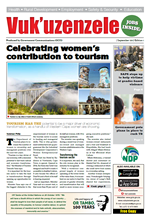
Translations
Africa to cash in on natural resources
Africa to cash in on natural resources JoyAfrica News
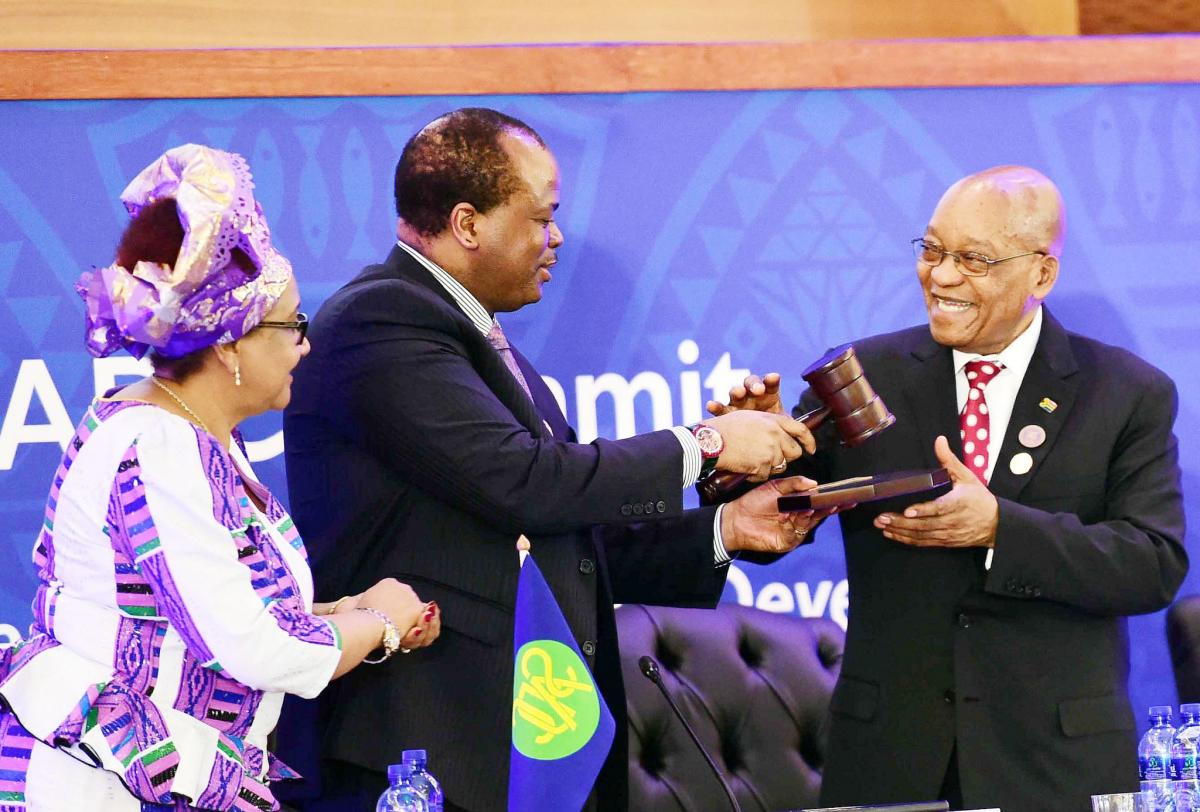 The 37th Southern African Development Community (SADC) Summit ended in Tshwane recently with South Africa taking over the chair of the regional bloc of countries.
The 37th Southern African Development Community (SADC) Summit ended in Tshwane recently with South Africa taking over the chair of the regional bloc of countries.
Heads of state of the 15 countries in the group left the capital after committing to use the region’s natural resources to drive projects to benefit its citizens.
The new SADC chair, President Jacob Zuma, said governments needed to explore ways to work with the private sector to promote sustainable growth.
It was time, the president said, for Africa to benefit from its wealth and not watch profits fund development on other continents. “Africa is the richest continent with the poorest people. Our heritage and endowment must be used to drive economic development for the benefit of all Africa’s citizens.”
Under South Africa’s leadership, the group of countries will prioritise industrial growth and regional trade. “The key activities during our chairship will be the development of a high-impact annual operation plan with targeted interventions and public policy tools to foster the development of regional value chains in agro-processing, pharmaceuticals and mineral beneficiation.”
Industrial development a priority
Increasing manufacturing capacity, productivity and competitiveness in these sectors as well as encouraging more intraregional trade would strengthen southern African economies and lift them above a dependence on raw materials to fuel growth. “This will not only raise the living standards of our people but also facilitate the rapid catch-up of the SADC countries with industrialised and developed countries,” the president said.
The summit started with all heads of state recognising that industrial and infrastructure development needs to be a priority in the region. Poor transport networks present the biggest challenge to creating a connected and prosperous continent.
South Africa will continue to push for implementation of the COMESA-EAC-SADC Tripartite Free Trade Area. This continent-wide common market is worth $1.3 trillion and will allow for the free flow of goods and people.
“These initiatives are geared towards creating employment, improving manufacturing, enhancing development and addressing poverty alleviation in the SADC region specifically.”
Member states also considered applications from the Union of Comoros and Burundi to join SADC. One of 75 key decisions taken by SADC ministers, the Comoros will be admitted while Burundi did not meet the criteria to become a member because of its security situation. In line with SADC’s Silencing the Guns initiative, the continent is looking to end all conflicts by 2020.
As President Zuma explained in his closing remarks, “The heads of state and government have reiterated their collective resolve to promote peace and stability since this is a precursor to economic growth and development.”
BRICS bank boon for African development
BRICS bank boon for African development JoyInternational Relations
The African branch of the BRICS New Development Bank opened in Johannesburg recently.
Headquarterd in Shanghai, China, the African office will identify and prepare proposals for African projects that would qualify for funding from the bank.
President Jacob Zuma said the establishment of the African office an important milestone for Africa as well as South Africa. He was joined at the launch in Sandton by the bank’s president Kundapur Vaman Kamath.
The bank, President Zuma explained, has been mandated to fund African infrastructure, especially in the areas of energy, transport and the water. This funding will help unlock the growth potential of the continent, the president believes.
“African countries generally do not have adequate infrastructure interconnections. As a result, we cannot maximise the benefits of regional trade. Worse still, the continent does not have adequate social infrastructure for the provision of basic services such as health and education, and we therefore are not able to significantly improve the living standards of our people.”
Fostering development
The World Bank estimates that there is a $100 billion a year funding shortfall for infrastructure projects in Africa. The shortage, especially for power generation projects, has restrained industrial growth across the continent.
President Zuma believes the bank’s role should be more than meeting the funding needs of African projects. The bank should become a centre of excellence to build capacity and share knowledge across the continent.
It should “…foster the development of member countries, support economic growth, promote and facilitate job creation and to build a knowledge sharing platform among developing countries”.
The setting up of the bank was announced in 2014 at a BRICS Summit in Brazil. It was established to meet the specific development needs of the global south. At the time, Kamath said: “Our objective is not to challenge the existing system as it is but to improve and complement the system in our own way.”
Celebrating women’s contribution to tourism
Celebrating women’s contribution to tourism LondekileTourism has the potential to be a major driver of economic transformation, as a handful of Western Cape women are showing.
The Department of Tourism plans to increase the number of women in ownership and managment positions over the next few years.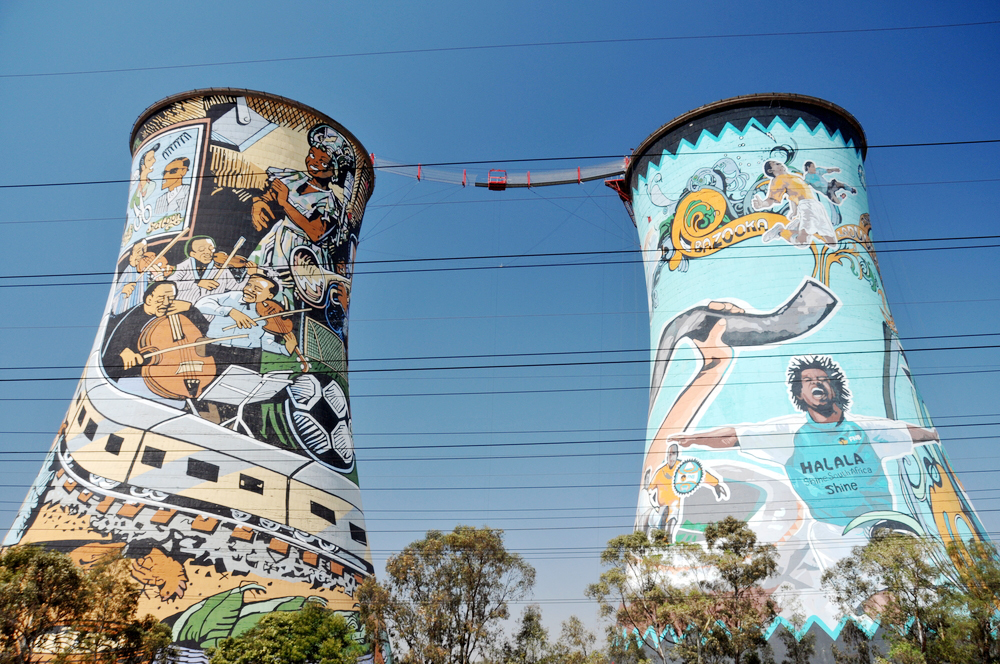

“Tourism is a key driver of our economy, with a immense potential to fast track radical and economic transformation,” the Minister of Tourism Tokozile Xasa says.
It is important for the tourism sector to take the lead in transformation through opening up opportunites for women.
Minister Xasa says one of the biggest obstacles to the empowerment of women in the tourism sector is access to funding and managerial skills. This is why government entities have set up programmes like the Industrial Development Corporation’s Women Entrepreneurial Fund.
The Park Inn Hotel by Radisson in Newlands, Cape Town, is special. Opened in 2014, the three-star hotel was designed and built to make it accessible to disabled visitors. It also houses the offices of Deaf SA and a third of its staff is hearing impaired.
Just as important, Minister Xasa said on a recent visit, is that more than 50 per cent of its staff are women, with 10 in managerial positions.
The minister was speaking during a recent tour of women-owned and managed tourism establishments in the Western Cape.
Transforming the tourism sector
It is important, she said, that the role women play in the industry be recognised.
“With a workforce comprised largely of women operating at the lower levels of the value chain, it is incumbent on our sector to lead the process of gender diversity and transformation that will result in more women occupying executive positions,” she said. 
The minister also visited women-owned restaurants and a bed and breakfast in Khayelitsha. She had lunch with Abigail Mbalo-Mokoena at her 4Roomed eKasi Culture.
Mbalo-Mokoena, a trained dentist and contestant on MasterChef SA, dreamed of owning a restaurant at which she could serve local cuisine in a township setting.
Another woman entrepreneur, Nomalungelo Sotyingwe, owner of Lungi’s BnB, shared her experiences, saying it has taken seven years for her neighbours to become comfortable with the idea of a hotel in their midst. “I can tell you now that things are running smoothly and whenever there are visitors from overseas, they feel at home.”
In applauding the women entrepreneurs, the minister said that it was important to have diverse voices in the tourism industry.
She congratulated the women who were offering new and unique experiences to the sector.
“A diverse pool of leaders can only give rise to alternative ways of thinking, and unravel opportunities for growth and enhanced competitiveness for our industry.”
30 in 5 programme
The minister’s tour was part of government’s Women in Tourism programme which aims to increase the number of women in management positions in the tourism sector to 30 per cent over the next five years.
In March last year, the department launched the Executive Development Programme at the UNISA Graduate School of Business Leadership. The course is aimed at black female employees in the tourism sector who are employed at junior or middle management level.
Speaking at the Southern Africa Tourism Services Association Conference in Cape Town recently, the minister said government was committed to creating an enabling environment to grow the industry.
The tourism sector supports about 700 000 jobs and contributes about three per cent to GDP, but more can be done, she believes.
In the North West, the provincial government is holding a summit to discuss the role of women in the economy. Dynamic entrepreneurs are being brought together to discuss the challenges they face as business owners and employers.
The minister believes that plans like this will help South Africa to develop authentic cultural experiences for tourists.
Domestic tourism key to growth
While international tourists are visiting the country in growing numbers, local tourism needs to be encouraged as well. In Khayelitsha, Sotyingwe regrets the small number of locals who visit her BnB. “During the Cape Town Jazz Festival I had just two South Africans visit.”
This needs to change, the minister said. “Worldwide, it is now acknowledged that domestic tourism is a key contributor to the growth of the tourism economy and provides a foundation for sustainable tourism growth and development, more specifically in times of global uncertainties.”
The department is in the middle of reviewing its Draft National Tourism Sector Strategy, a plan to make South Africa a top 20 tourist destination by 2020. The strategy is based on five pillars – effective marketing, ease of access, unique experiences, destination management and the development of an inclusive sector.
The department and the Tourism Charter Council will be hosting a Transformation Summit next month to exchange ideas on strategies and investment opportunities to improve the access of black entrepreneurs, particularly women, to the tourism value chain.
Centenary celebration of Nelson Mandela
Centenary celebration of Nelson Mandela Londekile“For to be free is not merely to cast off one's chains, but to live in a way that respects and enhances the freedom of others.” Nelson Mandela
Fire-fighting not sole domain of men
Fire-fighting not sole domain of men lebangThe City of eThekwini’s fire-fighting learnership programme stands to benefit the women who live there.
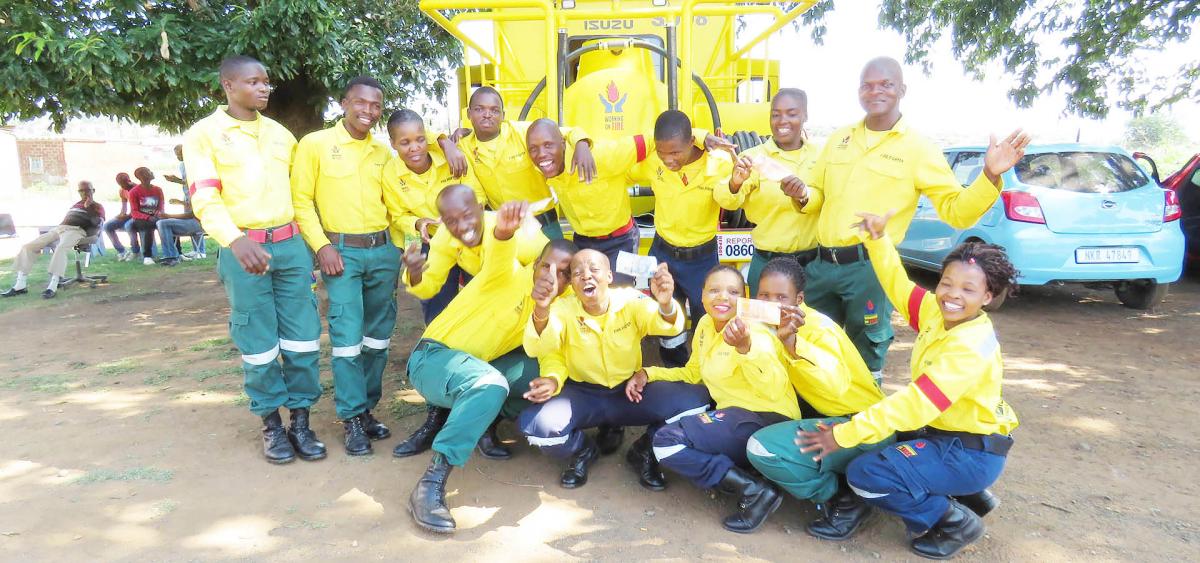 The City’s Fire Department has shortlisted about 1 600 people – 520 of them women – for selection for 30 learnerships aimed at addressing the City’s shortage of fire fighters.
The City’s Fire Department has shortlisted about 1 600 people – 520 of them women – for selection for 30 learnerships aimed at addressing the City’s shortage of fire fighters.
Chief Fire Officer Enock Mchunu said it is essential that fire fighters are well trained to help alleviate fires that endanger the community.
“We train a lot of trainees in this facility. Since 2004 the municipality has trained more than 350 fire fighters. We have 30 vacancies to fill but at the end of training the department may have more vacancies to fill and further decisions will be taken at that time.”
A profession for a disciplined team player
Commenting on the inclusion of women in the department, Mchunu said there was no longer a distinction based on gender – many women working as fire fighters had proved critics wrong.
“It is a profession for any person who is well disciplined as an individual and is capable of working in a team environment. The fire brigade is very strict in terms of discipline because we deal with people’s lives and there is no room for behaving in a manner that will compromise this,” said Mchunu.
Firefighting is a physically demanding profession and aspiring youth must associate themselves with hard physical training regimes. “They must refrain from substances with a potential to affect their health and mental capacity. Youth must associate themselves with their local fire stations and can request to visit and spend time with firefighters to observe their routines,” Mchunu added.
Saving lives and property
Explaining the important role fire fighters play in their communities, Mchunu said they save lives, property and render humanitarian services.
“Their daily work ensures a healthy and safe natural environment by controlling hazardous materials incidents like chemical spillages, toxins and other dangerous substances where members of the public would be exposed to, injured or even die.
“They also rescue people trapped in motor vehicle accidents and animals trapped in trenches and on cliffs.”
Mchunu said when fires break out they respond with confidence and at speed, enabling the adverse effects of fires to be minimised.
“To reduce incidents of fire and rescue, strict enforcement of building regulations and fire by-law enforcement is the order of the day. Fire fighters conduct scheduled routine fire inspections. Regulation of the erection and operation of major hazard installations is part of the work done to protect human life and prevention of property
damage.”
Gift of computers gives school reason to celebrate
Gift of computers gives school reason to celebrate lebangLearners at Vulamasang o High School in Bloemfontein are excited to be able to access new digital applications – the next step is a library.
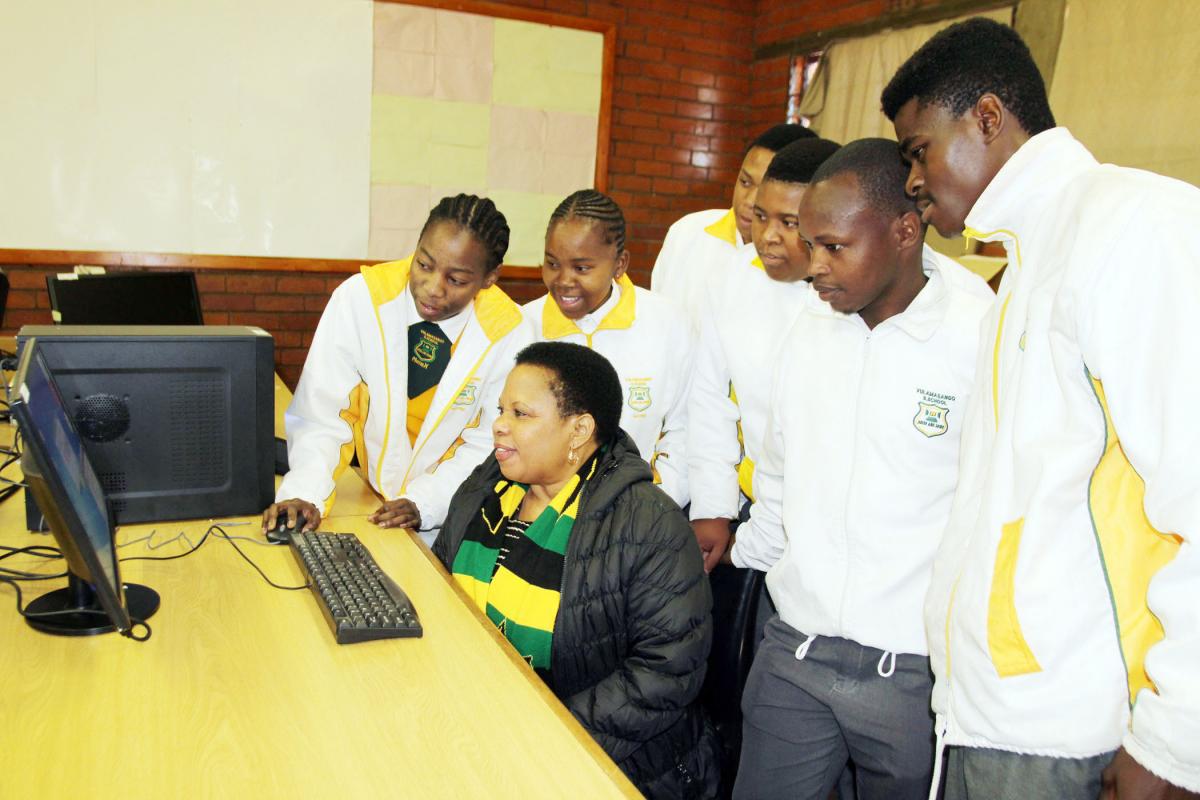 The pace and quality of learning has improved greatly for learners at Vulamasango High School in Rocklands, Bloemfontein, after receiving a donation of 10 computers.
The pace and quality of learning has improved greatly for learners at Vulamasango High School in Rocklands, Bloemfontein, after receiving a donation of 10 computers.
The Deputy Minister of Arts and Culture Maggie Sotyu recently donated the computers, fulfilling a promise she made when she visited the school earlier this year.
The donation is aimed at encouraging learners to acquire basic computer knowledge. “I want you to be skilled, and to have a basic understanding of a computer and be familiar with it. This is a lifelong skill that you will take everywhere with you,” the Deputy Minister said. She called on the learners to take care of the computers and use them wisely.
A new learning experience
Deputy Minister Sotyu motivated the children to believe in themselves and to never underestimate the power that they have.
Matric learner Lusanda Molusi couldn’t hide his excitement. “I’m very excited about the new computers. I know that they will change how I learn as they have new and updated applications compared to the old ones which were slow. These will definitely bring a new experience to learning.”
Acting principal Ntsheleng Maphisa thanked the Deputy Minister for her efforts, adding, “This is a very important day for us, these computers are a legacy for these children as everything is all about computers.”
The school previously had 13 working computers.
Deserving schools
Vulamasango, said to be one of the oldest schools, has been struggling without equipment.
The Deputy Minister is trying to secure sponsorships for schools. “We look at certain schools and decide which one is more deserving and needing,” she said.
The Department of Arts and Culture is responsible for libraries, and the Deputy Minister wants to work on securing one for the school.
“Vulamasango is one of the schools that I discovered doesn’t have a library. And for my next project, I will be working towards getting a library for the school, in partnership with the Department of Education.”
Government puts plans in place to curb TB
Government puts plans in place to curb TB lebangThe national Department of Health is conducting its first Tuberculosis (TB) Prevalence Survey to help it improve the effectiveness of its national control programme.
 Fieldworkers will visit households to identify possible participants, who will be transported to the closest clinic for testing and to take part in the survey.
Fieldworkers will visit households to identify possible participants, who will be transported to the closest clinic for testing and to take part in the survey.
The survey will begin in eThekwini this month and will be rolled out across the country. The country has been divided into three zones, depending on TB infection rates. Gauteng and Limpopo are low; KwaZulu-Natal, the Free State and Mpumalanga are medium, and the remaining four provinces are considered high.
The Prevalence Survey will give government a better understanding of where help is needed and what types of help should be considered.
Participation is voluntary and will take about 60 minutes, including TB screening.
TB is treatable
Tuberculosis or TB is an illness caused a by germ, that mainly affects the lungs but can sometimes affect other parts of the body.
It is spread from person to person through coughing. Sometimes you may not even know you are sick.
Communities in informal settlements, people living with HIV or diabetes, pregnant women and children are most at risk.
Common symptoms include weight loss, fever, a cough and night sweats, which may seem mild for several months thus delaying patients feeling the need to seek medical help.
Treatment is a course of four drugs, taken over six months, under medical supervision.
Stopping treatment, or using the drugs incorrectly, could lead to a drug resistant strain of TB. Treatment of drug resistant TB requires more toxic medication that may have harmful effects on patients.
It is important to know that TB is curable and free treatment is available. If you do have TB, you will receive medication and assistance from your nearest clinic.
The message from the department is clear: know the symptoms, get treated, get clear.
Growing a sustainable coastal and marine tourism destination
Growing a sustainable coastal and marine tourism destination LondekileCoastal and marine tourism is expected to create about 116 000 direct jobs by 2026, reducing poverty, inequality and unemployment.
South Africa’s tourism sector is intent on offering domestic and international travellers world-class marine and coastal tourism opportunities.
These opportunities will expand the options available to travellers and increase the socio-economic value of tourism to South Africans.
Tourism is an extremely important contributor to South Africa’s economy. It is one of the biggest drivers of job creation in South Africa and contributors to the Gross Domestic Product (GDP). This is according to Statistics SA’s latest release of its Tourism Satellite Account for South Africa report.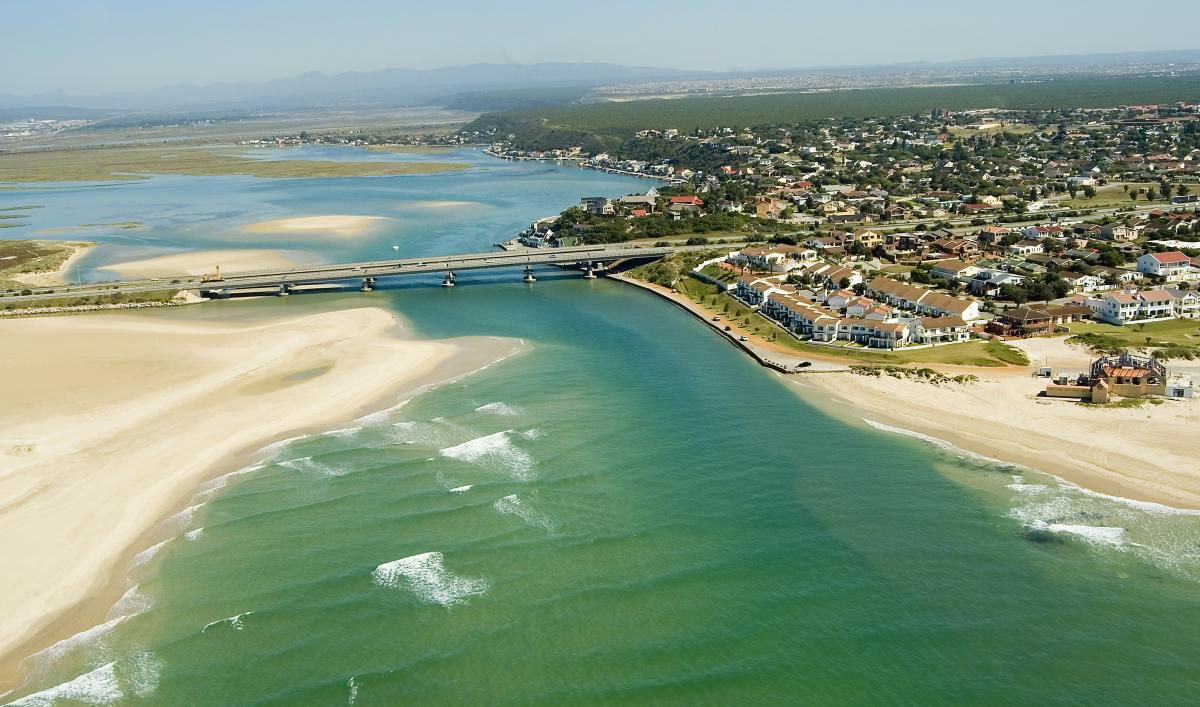
In August Cabinet approved the Coastal and Marine Tourism Implementation Plan (CMTIP) which was drawn up by various stakeholders in the tourism sector, led by the Department of Tourism.
The vision is to grow a world-class and sustainable coastal and marine tourism destination that makes the most of South Africa’s competitive advantage in nature, culture and heritage.
Minister of Tourism Tokozile Xasa said, “The coastal and marine tourism sector will contribute about R21.4 billion to the GDP and create about 116 000 direct jobs by 2026, thus reducing poverty, inequality and unemployment, while contributing to sustainable livelihoods and development.
“These estimates are conservative as they are growing off a low 2015 base of R11.9 billion direct contribution to the GDP and 64 400 direct jobs.”
Six priority areas
In implementing the CMTIP the focus will be on prioritising destinations rather than individual products or tourism projects.
In the first five years of implementation the following nodes (geographic destinations) will be targeted:
- Node 1: Durban and surrounds (KwaZulu-Natal).
- Node 2: Umkhanyakude District including Umhlabuyalingana and surrounds (KwaZulu-Natal).
- Node 3: Port St Johns to Coffee Bay (Eastern Cape).
- Node 4: East London, Port Elizabeth and surrounds (Eastern Cape).
- Node 5: Cape Town and surrounds (Western Cape).
- Node 6: West Coast and surrounds (Northern Cape).
Initiatives in these nodes cover six themes, namely marketing, events and routes; regulations and permitting; research and spatial planning; beach precinct development, tourism infrastructure and tourism safety; maritime tourism; and skills development.
The Blue Flag Beaches Programme, Boat-based Whale Watching and Shark Cage Diving, and Offroad Vehicle 4x4 Beach Driving projects will be included in the CMTIP’s first phase.
Minister Xasa thanked all stakeholders who helped develop detailed plans for the CMTIP, pointing out that its successful implementation depends on partnerships. “Together We Do Tourism,” concluded Minister Xasa.
Jobs: Department of Environmental Affairs
Jobs: Department of Environmental Affairs JoyNominations for the Appointment of Suitable Persons as Members of the Board of South African National Parks
In terms of Section 59 of the National Environmental Management of Protected Areas Act, 2003 (Act 57 of 2003), interested parties are invited to nominate suitable persons to be appointed as members of the Board of South African National Parks.
A Curriculum Vitae must be attached, which includes the following:
- Personal details, including postal/residential addresses and contact details of the nominee;
- Nominee’s qualifications or experience;
- Certified copies of certificates; and
- Acceptance letter of the Nominee.
Nominations must be presented in writing and forwarded to the Director-General, Department of Environmental Affairs. For Attention: Ms S. Sangqu, Private Bag X447, Pretoria, 0001.
Enquiries: Ms S. Sangqu, tel. (012) 399 9017/6 /
email: ssangqu@environment.gov.za
Closing Date: 30 Days After Date of Publication
General Information
A person to be nominated must: be fit and proper to hold office as a member and have appropriate qualifications and experience in the field of conservation, protected areas management, tourism development, biodiversity sector transformation, human resource management, financial and risk management or otherwise possess special insight in relation to any aspect of the activities of the South African National Parks. In addition, a person to be nominated must have a general understanding of corporate governance.
A person holding office as a Member of Parliament or a provincial legislature or who has been removed from office in terms of Section 21 of the Act, may not be appointed as a member of the Board.
Jobs: Department of Justice and Constitutional Development
Jobs: Department of Justice and Constitutional Development JoyDeputy Director: Guardian’s Fund
Reference: 17/09/CFO
Package: R657 558 – R774 576 per annum (All inclusive).
The successful candidate will be required to sign a performance agreement.
Requirements: A Degree in Financial Management/Accounting or equivalent qualification; A minimum of 5 years relevant experience in a financial accounting/management environment, of which a minimum of 3 years must be at junior/middle management level; Knowledge of the Public Finance Management Act and National Treasury Regulations; Knowledge of GAAP and GRAP; Knowledge and working experience on a recognized accounting software package will be an advantage; Extensive experience in bank, cash book reconciliations and Financial Statements up to Trial Balance; A valid driver’s licence.
Enquiries: Ms E. Sebelebele (012) 357 8662
Closing Date: 11 September 2017
Assistant Director: Third Party Funds: (4 Posts) (Contract Appointment Ending 30 September 2018)
Reference: 17/15/Cfo
Salary: R334 545 + 37% = R458 326 in lieu of benefits.
The successful candidate will be required to sign a performance agreement.
Requirements: A tertiary qualification in financial management or equivalent qualification at NQF level 6; A minimum of 3 years experience in a financial management environment; Knowledge and experience in Third Party Funds management at the DOJ&CD; Knowledge of Public Finance Management Act and National Treasury Regulations; Knowledge of MojaPay and JDAS/SAS operational as well as training experience; A valid driver’s licence.
Enquiries: Ms E. Sebelebele (012) 357 8662
Assistant Director (Contract Appointment Ending 30 September 2018)
Reference: 30/17EC
Salary: R334 545 + 37% = R458 326 in lieu of benefits.
The successful candidate will be required to sign a performance agreement.
Requirements: An appropriate tertiary qualification (degree) or equivalent qualification at NQF level 6; Minimum of 3 years’ experience in management; Knowledge of the Departmental strategic goals; Knowledge of the public Service and the working of the Government.
Enquiries: Mrs. Pretorius (043) 702 7000
Maintenance Officer Mr1 - Mr3 (4 Posts)
Note: (Contract Appointment Ending 30 September 2018)
Reference: 17/69/Kzn Centre: Magistrate’s Office Camperdown (1)
Reference: 17/70/Kzn Centre Magistrate’s Office KwaDukuza (1)
Reference: 17/71/KZN Centre Magistrate’s Office Nongoma (1)
Reference: 17/72/KZN Centre Magistrate’s Office Vryheid (1)
Salary: R174 606 + 37% = R239 210 in lieu of benefits. (Salary will be in accordance with OSD determination). The successful candidate will be required to sign a performance agreement.
Requirements: An LLB Degree or recognized 4 year legal qualification; Extensive knowledge of the maintenance system; Proficiency in at least two official languages; Understanding of all services and procedures in the area of maintenance and other areas of family law; A valid driver’s licence;
Enquiries: Mr J.N. Mdaka (031) 372 3000
Closing Date: 04 September 2017
Note: Interested applicants may visit the following website: www.justice.gov.za or www.dpsa.gov.za to view the full job specification of the above positions. Applications must be submitted on Form Z83, obtainable from any Public Service Department or on the internet at www.gov.za. A Z83 form & CV must be accompanied by original certified copies of qualifications, identity document and a driver’s licence where necessary. A SAQA evaluation report must accompany foreign qualifications. Applications that do not comply with the above mentioned requirements will not be considered. All shortlisted candidates for SMS posts will be subjected to a technical exercise that intends to test relevant technical elements of the job, the logistics of which will be communicated. Following the interview and technical exercise, the selection panel will recommend candidates to attend a generic managerial competency assessment (in compliance with the DPSA Directive on the implementation of competency based assessments). Candidate will complete a financial disclosure form and also be required to undergo a security clearance. If the candidate is applying for an OSD post, certificates of service must be attached to the CV.
The DOJ&CD is an equal opportunity employer. In the filling of vacant posts the objectives of section 195 (1) (i) of the Constitution of South Africa, 1996 (Act No: 108 of 1996), the Employment Equity imperatives as defined by the Employment Equity Act, 1998 (Act No: 55 of 1998) and relevant Human Resources policies of the Department will be taken into consideration. Reasonable accommodation shall be applied for People with Disabilities including where drivers licence is a requirement. Shortlisted candidates will be subjected to a personnel vetting process. Correspondence will be limited to shortlisted candidates only. If you do not hear from us within 3 months of this advertisement, please accept that your application has been unsuccessful. The department reserves the right not to fill these positions. Women and people with disabilities are encouraged to apply and preference will be given to the EE Target.
Tel: 012 315 1111 Private Bag X81, Pretoria, 0001 Momentum Centre, 329 Pretorius Street, Pretoria www.justice.gov.za dojcd_ZA DOJ CD
Jobs: Department of Labour - Sep 2017
Jobs: Department of Labour - Sep 2017 JoyRisk Management Committee Member
Reference No: HR4/17/08/41HO Duration: Three years contract
Remuneration: Members will be remunerated according to rates approved by the Department
Enquiries: Mr Zwane, Tel: (012) 309 4561
Centre: Department of Labour: Head Office, Pretoria Head Office
Chief Director: Human Resources Management: Private Bag X 117, Pretoria, 0001 Or hand deliver at 215 Francis Baard Street.
Statutory Services Officer
Reference No: HR 4/4/9/280
Salary: Commencing: R 334 545 per annum
Enquiries: Mr IS Vass, Tel: (053) 8381500
Centre: Provincial Office: Kimberley
Provincial Ofiice
Chief Director: Provincial Operations: Private Bag X 5012, Kimberly, 8301 or hands deliver at Cnr Compound and Pniel Road
Provincial Chief Inspector: IES (2 posts)
Centre: Provincial Office: Free state
Reference No: HR 4/17/08/16HO
Salary: All inclusive package: R898 743 per annum
Enquiries: Ms A Moiloa, Tel: (012) 309 4553
Centre: Provincial Office: Eastern Cape
Reference No: HR 4/17/08/17HO
Salary: All inclusive package: R898 743 per annum
Enquiries: Ms A Moiloa, Tel: (012) 309 4553
Deputy Director: COIDA
Reference No: HR 4/4/7/18
Salary: All inclusive: R 657 558 per annum
Enquiries: Ms LP Magubane Tel: (013) 655 8733
Centre: Provincial Office: Emalahleni
Provincial Ofiice
Chief Director: Provincial Operations: Private Bag X 7263, Emalahleni, 1035 or hands deliver at Department of Labour,Cnr Hofmeyer street and Beatty avenue
Chief legal administration officer
Reference No: HR 4/17/08/15 HO
Salary: All inclusive: R1 068 564 per annum
Enquiries: Ms BB Matebesi, Tel: (012) 309 4865/4226
Head Office
Chief Director: Human Resources Management, Department of Labour, Private Bag X117, Pretoria, 0001
Or hand deliver: 215 Francis Baard Street, Laboria House.
Closing Date for Applications:
Monday, 18 September2017 at 16:00
For full details visit www.labour.gov.za
Applications must be submitted on form Z83, obtainable from any Public Service Department or on the internet at www.gov.za/documents. The fully completed and signed form Z83 should be accompanied by a recently updated, comprehensive CV as well as recently certified copies of all qualification(s) including a Senior Certificate and ID-document [Driver’s license where applicable]. Non-RSA Citizens/Permanent Resident Permit Holders must attach a copy of their Permanent Residence Permits to their applications. Should you be in possession of a foreign qualification, it must be accompanied by an evaluation certificate from the South African Qualification Authority (SAQA). Applicants who do not comply with the above-mentioned requirements, as well as applications received late, will not be considered. The Department does not accept applications via fax or email. Failure to submit all the requested documents will result in the application not being considered. Correspondence will be limited to short-listed candidates only. If you have not been contacted within eight (8) weeks after the closing date of this advertisement, please accept that your application was unsuccessful. Suitable candidates will be subjected to a personnel suitability check (criminal record, citizenship, credit record checks, qualification verification and employment verification). Where applicable, candidates will be subjected to a skills/knowledge test. All shortlisted candidates for SMS posts will be subjected to a technical competency exercise that intends to test relevant technical elements of the job, the logistics of which be communicated by the Department. Following the interview and technical exercise, the selection panel will recommend candidates to attend generic managerial competencies using the mandated DPSA SMS competency assessment tools. Successful candidates will be appointed on a probation period of 12 months. The Department reserves the right not to make any appointment(s) to the above post. The successful candidate will be expected to sign a performance agreement. The Department of Labour is an equal opportunity affirmative action employer. The employment decision shall be informed by the Employment Equity Plan of the Department. It is the Department’s intention to promote equity (race, gender and disability) through the filling of this post(s) with a candidate whose transfer / promotion / appointment will promote representativity in line with the numerical targets as contained in our Employment Equity Plan.
Jobs: Social Development - Sep 2017
Jobs: Social Development - Sep 2017 JoyIt is our intention to promote representivity (race, gender and disability) in the Public Service through the filling of this post and candidates whose transfer / promotion/ appointment will promote representivity will receive preference.
Post: Director: Sectoral and Corporate Strategy And Planning
Ref No: T2/2017
Chief Directorate: Strategic Management and Change Management
Total Cost-To Employer Package: R898 743 per annum
This inclusive remuneration package consists of a basic salary, the states’ contribution to the Government Employees Pension Fund and a flexible portion that may be structured i.t.o. the applicable rules.
Centre: HSRC Building, Pretoria
Requirements: An appropriate Bachelor’s Degree or equivalent qualification (NQF level 7) PLUS five (5) years of experience at a middle/senior management level in the field of strategy planning and management. Knowledge of the relevant Public Service Regulatory Legislations. Knowledge and experience in general management. Knowledge of risk management.
Competencies: Financial management skills. Knowledge management skills. Change management skills. People management and empowerment skills. Client orientation and customer focus. Communication (written, verbal and liaison) skills. Analytical skills. Planning and organising skills. Problem-solving skills. Computer literacy.
Attributes: Interpersonal relations. Ability to work independently and under pressure. Innovative and creative. Independent thinker. Ability to work in a team and independently. Cultural sensitivity. Adaptability. Confident. Political sensitivity. Cost consciousness. Honesty and integrity.
Responsibilities: Develop the annual strategic and performance plans for the department. Formulate and evaluate the Social Development Sector Strategy. Align the national strategic plan with the sector strategy (priorities). Facilitate the development of operational plans for business units in the Department. Conduct strategic environmental analysis and annual strategic reviews in the context of both government and the Department’s commitments. Facilitate the institutional transformation process. Provide support to Provincial Social Development Departments with regard to planning. Develop, maintain and update the strategic information portal for planning purposes.
Note: In terms of the Chief Directorate’s employment equity target, African males and females as well as persons with disabilities are encouraged to apply.
Enquiries: Ms N Vilakazi, Tel: 012 312-7293
Applications: The Director General, Department of Social Development, Private Bag X901, Pretoria, 0001, Physical Address: HSRC Building, 134 Pretorius Street.
For attention Ms E Steenkamp
Closing date: 15 September 2017
NOTE: Curriculum vitae with a detailed description of duties, the names of two referees and certified copies of qualifications and identity document must accompany your signed application for employment (Z83). In the event of hand delivery of applications, applicants must sign an application register book as proof of submission. Short listed candidates for SMS posts will be subjected to a technical exercise that intends to test relevant technical elements of the job, the logistics of which will be communicated by the Department. Following the interview and technical exercise, the selection panel will recommend candidates to attend a generic managerial competency assessment (in compliance with the DPSA Directive on the implementation of competency based assessments) The competency assessment will be testing generic managerial competencies using the mandated DPSA SMS competency assessment tools. The successful candidate for a SMS post will sign an annual performance agreement, complete a financial disclosure form and also be required to undergo a security clearance. If the candidate is applying for an OSD post, certificates of service must be attached to the CV. It is the applicant’s responsibility to have foreign qualifications evaluated by the South African Qualification Authority (SAQA). Failure to submit the requested documents will result in your application not being considered. Personnel suitability checks will be conducted on short listed candidates and the appointment is subject to positive outcomes of the checks. Correspondence will be limited to shortlisted candidates only. The selection of candidates will be done with due regard to the relevant aspects of the selection process as set out in the Public Service Regulations, 2016 4/67. Applications received after the closing date will not be taken into consideration. No faxed or e-mailed applications will be considered. If you have not been contacted within three months after the closing date of this advertisement, please accept that your application was unsuccessful. Candidates requiring additional information regarding the advertised post may direct their enquiries to the person as indicated. Internal applicants must submit and register their employment applications at the register book in the DSD reception area for the attention of Ms E Steenkamp.
It is our intention to promote representivity (race, gender and disability) in the Public Service through the filling of these posts and candidates whose transfer / promotion/ appointment will promote representivity will receive preference.
Land claims head hands over title deeds
Land claims head hands over title deeds lebangChief land claims commissioner Nomfundo Ntloko-Gobodo said government’s role doesn’t end with handing over title deeds. It will continue to assist communities so that they become sustainable.
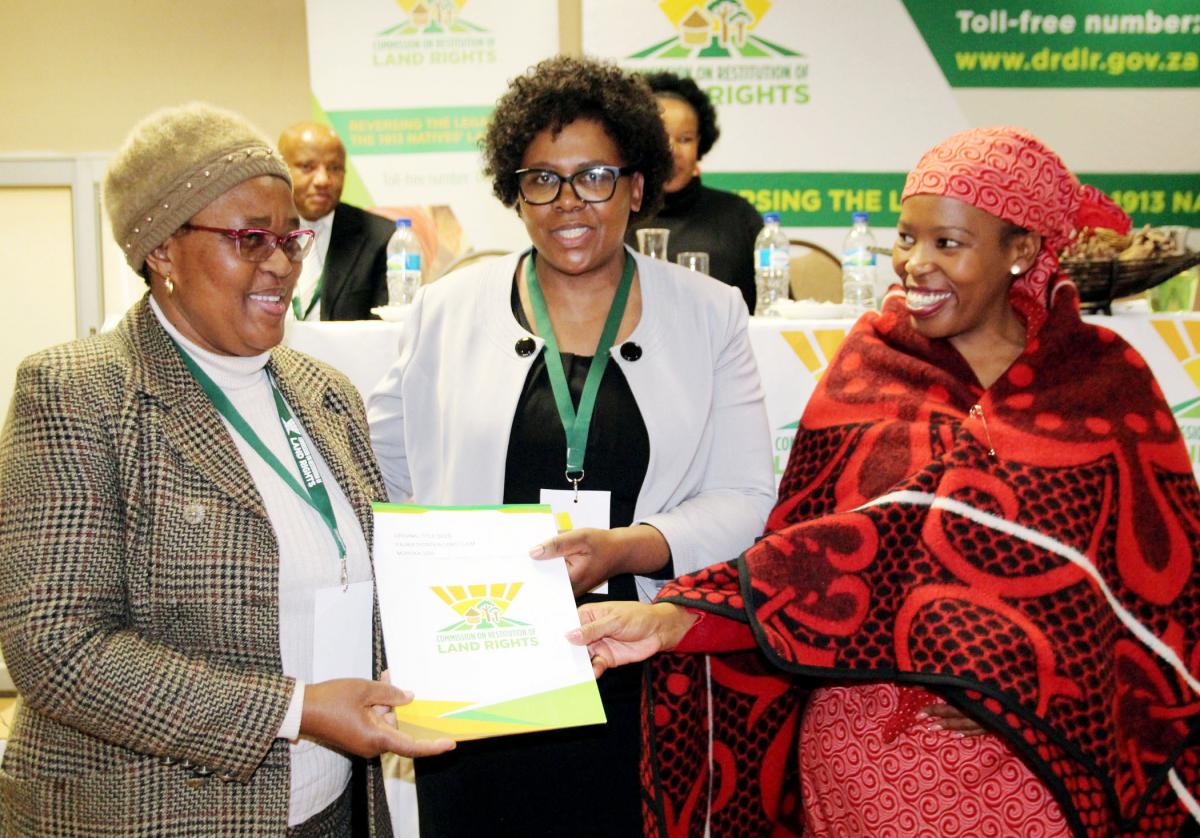 Ntloko-Gobodo was speaking at a title deeds handover ceremony in Thaba Nchu, where nine land claimants from across the Free State received 11 title deeds for more than 6 500 hectares of agricultural land.
Ntloko-Gobodo was speaking at a title deeds handover ceremony in Thaba Nchu, where nine land claimants from across the Free State received 11 title deeds for more than 6 500 hectares of agricultural land.
The state spent R31.2 million acquiring seven farms, two of which were state-owned land.
Ntloko-Gobodo said her office partnered with the provincial Department of Agriculture and Rural Development to ensure the sustainability of the project.
“We want to create entities for the communities through short- and long-term goals that can be used to ensure that the projects are sustainable.
Help with business plans
“Together with our partners and other stakeholders we have set up structures for beneficiaries so that they know and understand what value can be added to sustain the land and grants.”
Queen Thato Mopeli from Qwa Qwa urged claimants to work together towards prosperity. “Let us be united by this inheritance that we have gained today. Let us gain strength and work together for our success.”
Another beneficiary, 67-year-old Keneilwe Goronyane, who lodged a claim 15 years ago, said the land was handed over to her family on paper but they could not occupy it until they received the title deed.
“My late sister and I chose to have the land because we realised its value and our great grandfather was a farmer.”
Government will assist Goronyane with surveying the land, a way forward and a business plan.
“I’m very excited that this day is finally here, I can’t wait to step onto the farm and start working it,” said Goronyane
Mentors, master classes help female entrepreneurs grow skills
Mentors, master classes help female entrepreneurs grow skills LondekileA business development programme has been set up in the Eastern Cape to make sure small enterprises are well managed and ready for long-term growth.
A development programme in the Eastern Cape aims to open up business opportunities for women-led small enterprises.
The programme, run by the Eastern Cape Development Corporation (ECDC) and the Uitenhage Despatch Development Initiative (UDDI), recently saw 19 participants graduate from nine months of intensive training.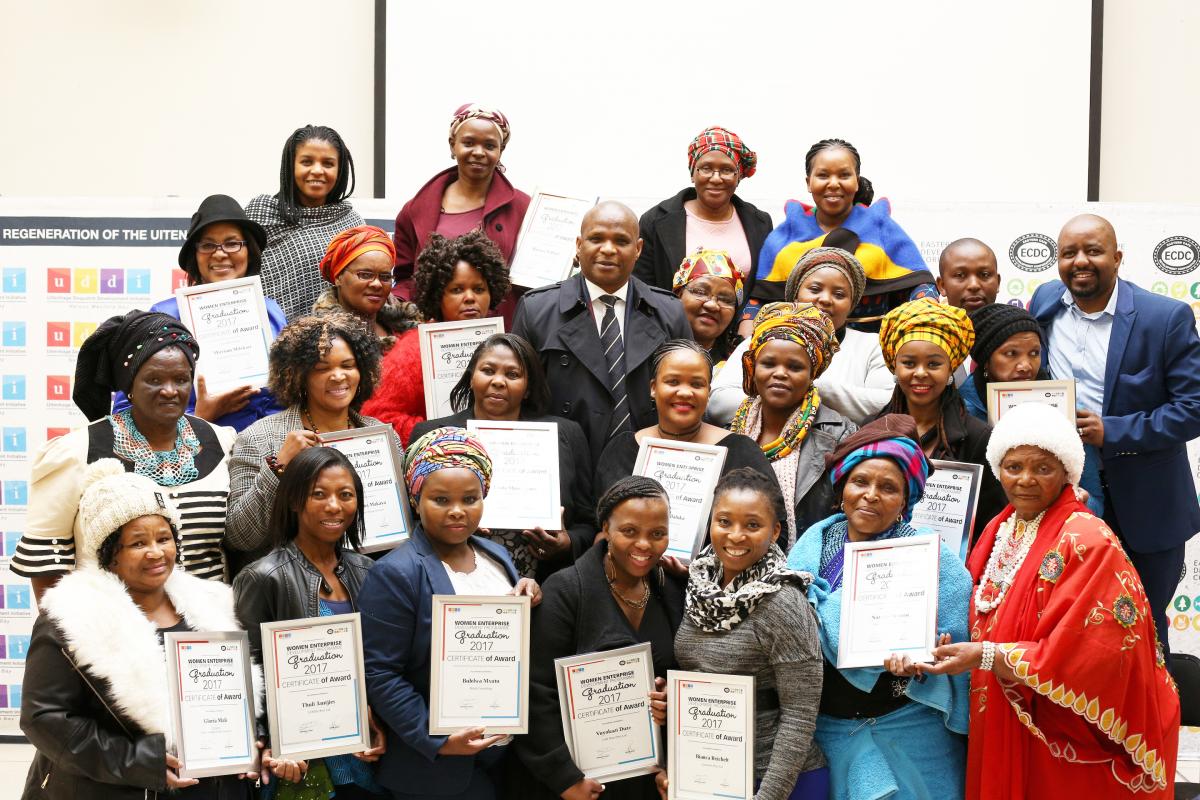
The graduation ceremony, officiated by the MEC for Economic Development, Environmental Affairs and Tourism Sakhumzi Somyo, was held at the Nelson Mandela Bay Science and Technology Centre in Uitenhage.
The programme recruited participants via advertising and referrals from partner organisations, such as business associations.
Twenty-one enterprises met the criteria and were admitted to the programme to receive training, mentorship and coaching, which covered areas such as strategy development, financial management, marketing management and business legal compliance.
All the women head up businesses in the Nelson Mandela Bay Metro region.
Opening access to markets
ECDC business support manager Mpumi Fundam said the programme is aimed at addressing the “entrepreneurial skills bottleneck” for women-owned emerging enterprises in the Nelson Mandela Metropolitan area.
“The programme is aimed at facilitating growth and sustainability of women-led small businesses, supporting women-owned businesses to operate in a professional manner while improving their administrative efficiencies and business compliance and developing business management and technical skills to create readiness for markets and investor opportunities”.
Once on the programme, the businesses were assessed and gaps identified. “Mentors with relevant skills were recruited and a programme to address the identified needs was developed,” said Fundam.
Three master classes were held, focusing on business strategy development, financial management and business regulations and compliance.
One-to-one mentorship and coaching was provided to ensure that enterprises were assisted to develop strategies, develop and implement financial management systems, and receive compliance support, said UDDI chief executive officer Patricia Dlamini.
“The programme was in response to a need to provide non-financial support to harness the competitiveness of these small businesses. The intention is to ensure that these enterprises are well managed and are prepared for long-term growth,” Fundam said.
Gaining business skills
Participant Nozipho Hlalukana, from cleaning company Bibstar Trading and Projects, said the programme had provided her with general tools to grow and sustain her business.
She was supported by mentor, business trainer Lulama Jakavula. “Her help was instrumental in ensuring that the company developed proper financial management systems,” said Hlalukana, who employs 10 people and services companies such as the South African Maritime Authority, the Coega Development Corporation and the Department of Rural Development.
Other training was on people management and payroll systems. “We also had access to an extended network of mentors with different expertise that we could lean on for support and advice.”
Other participants included Zozinette, a 100 per cent women-owned enterprise in Port Elizabeth that produces a locally-made range of custom-designed baby carriers, including stretch wraps, woven wraps, ring slings and buckle carriers, and Lumia, a 100 per cent black women-owned business in KwaNobuhle in Uitenhage specialising in DSTV and Openview HD installations, upgrades and support services.
Musicians given a voice at indaba
Musicians given a voice at indaba JoyInstrumentalists, composers, lyricists and vocalists were among those members of the music sector who participated in the Musicians Indaba hosted by government in the Soweto Theatre in August.
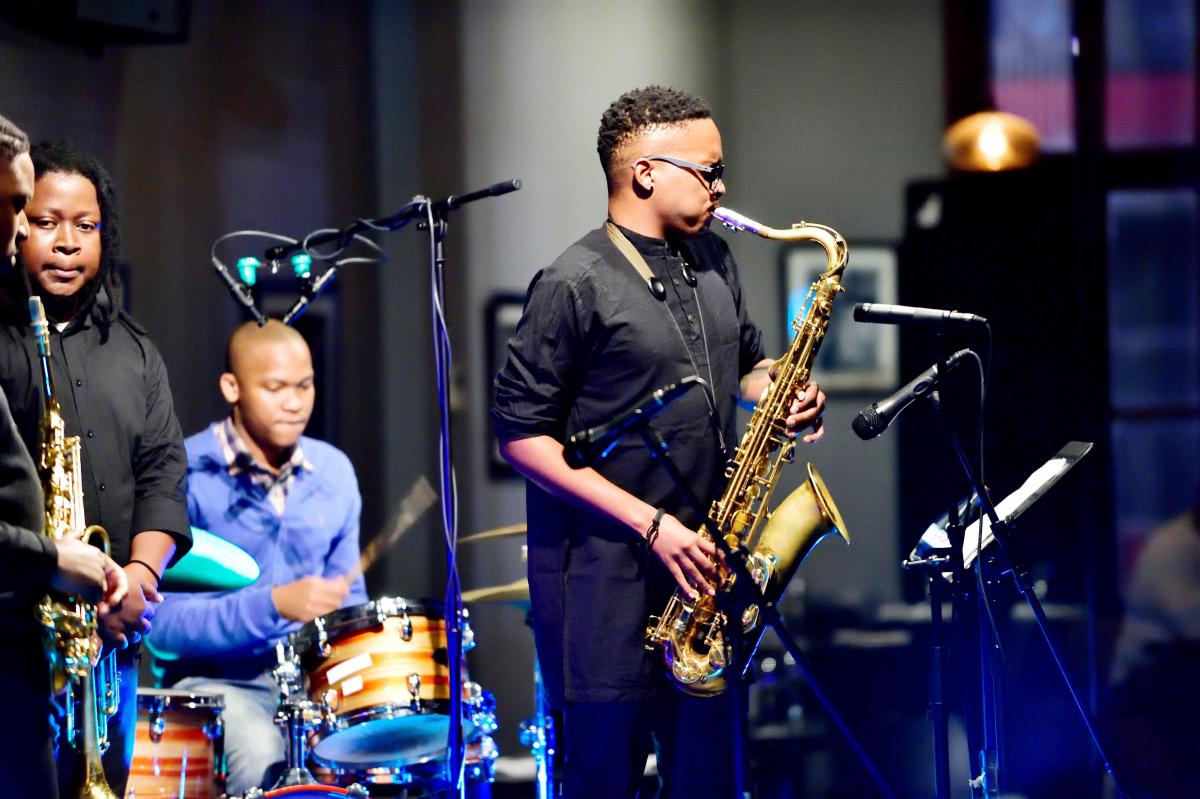 It gave musicians an opportunity to speak to government about issues that affect them. These include copyright protection and infringement, piracy, local content and airplay in broadcast media. It was also a time for them to revisit matters raised in the past and not yet resolved.
It gave musicians an opportunity to speak to government about issues that affect them. These include copyright protection and infringement, piracy, local content and airplay in broadcast media. It was also a time for them to revisit matters raised in the past and not yet resolved.
Addressing the indaba, Deputy Minister in the Presidency and Chairperson of the Presidential Task Team on Creative Industries, Buti Manamela, said: “Your perspectives help to bridge the social divides while bringing our communities closer. You have an important social cohesion role to play.”
He added: “Your contribution to the economy is growing. We now have the tools within the Department of Arts and Culture to quantify this contribution. And the evidence is telling us that your contribution in monetary and job creation terms are growing day by day.
Seeking solutions to social security
“We are mindful that the creative industries sector is a broad one. Today we are meeting with a sub-sector of the creative industries – we are meeting with musicians and stakeholders within the music industry.”
Similar indabas will be held with the other sub-sectors within the creative industries.
“One of the most important tasks given to the task team is to seek solutions to the issues of social security and income smoothing for creative industries practitioners.”
He told the indaba that a dedicated technical subcommittee of officials from Treasury, social development, labour and arts and culture had worked on an intervention model that will lead to a long-lasting solution to address the social security question within the creative arts sectors.
NSFAS 2018 funding applications open
NSFAS 2018 funding applications open lebangThere is a spark in Tshwaro Mochoari’s eyes when he speaks of the fulfilment he gets from working with young people and assisting them to apply for financial support for 2018 from the National Student Financial Aid Scheme (NSFAS).
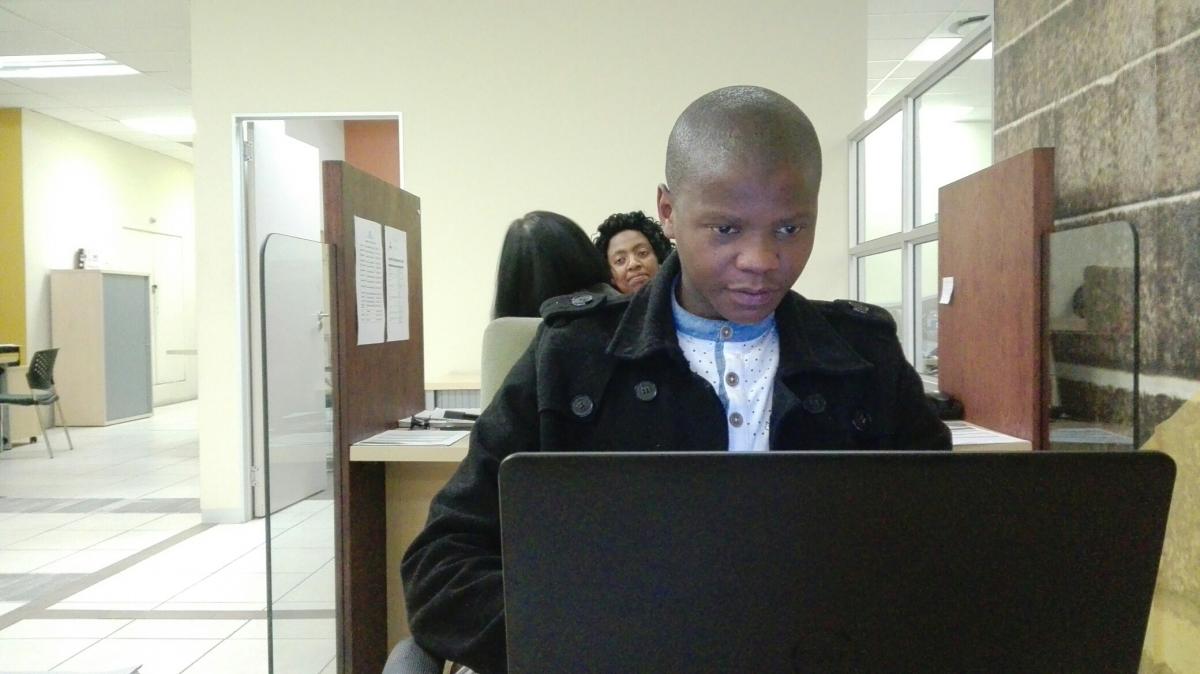 The 24-year-old is one of the 100 young graduates employed in a partnership between NSFAS and the National Youth Development Agency (NYDA), at NYDA branches and local youth offices around the country. He’s based at the Bloemfontein NYDA branch. Even more interesting is that Tshwaro himself was funded by NSFAS for three of the four years he studied at UFS. He is a Communications Science graduate from the University of the Free State (UFS).
The 24-year-old is one of the 100 young graduates employed in a partnership between NSFAS and the National Youth Development Agency (NYDA), at NYDA branches and local youth offices around the country. He’s based at the Bloemfontein NYDA branch. Even more interesting is that Tshwaro himself was funded by NSFAS for three of the four years he studied at UFS. He is a Communications Science graduate from the University of the Free State (UFS).
He sees the short-term employment programme as a stepping stone to bigger things. “I come from a family of six people in Thaba Nchu. I am the second of four siblings and in my hometown there are very few opportunities and a lack of access to resources. So, I have a dream that this NSFAS opportunity will move me higher, into bigger things,” he said.
Tshwaro learnt about the NSFAS graduates’ empowerment from an email he received advertising new job openings. “A few months back I attended a career fair and registered my email address, which they included in an email database to alert unemployed graduates to new job opportunities. When I saw the advert, I applied immediately without wasting time and I received a call from the NSFAS a week later,” he says.
The graduates underwent rigorous training by NSFAS, at different NYDA centres, to be ready to respond to learner enquiries and assist applicants.
Partnership makes NSFAS applications easier
The partnership enables the NYDA to avail its 15 branches and 100 local youth offices nationwide to young people in remote areas to be able to walk in and be assisted with manual and online 2018 NSFAS applications.
The Bloemfontein NYDA branch says since the opening of applications on 1 August, the majority of walk-in visitors have been NSFAS applicants. “On average I assist about 10 applicants per day, with both manual and online applications, depending on their preference,” he says.
NSFAS applications close on 30 November 2017. Grade 12 learners and those who have completed Grade 12 are encouraged to apply early.
“We are grateful to the NYDA for agreeing to avail their branches to enable learners to apply for NSFAS 2018. We call on learners to make use of this opportunity and to apply early,” said Lerato Nage, NSFAS acting executive officer.
Learners can apply online at www.nsfas.org.za.
Never give up, farmer tells entrepreneurs
Never give up, farmer tells entrepreneurs lebangLoyiso Pepeta, former chief financial officer of Ingquza Hill Local Municipality, always knew that he would have his own business one day. Which is why, when he heard that a Kokstad farm was on the market in 2012, he took a leap of faith and resigned from his job.
His farm, Copperfield, has a dairy with 146 Jersey cows that produce 2 500 litres of milk a day, as well as 226 cows for beef production. The farm supplies Spar, Rhino Supermarkets and wholesalers across KwaZulu-Natal and the Eastern Cape with milk, maas and yoghurt.
It started with 10 employees but now has 36 permanent staff members.
Pepeta said his journey would not have been possible without a R4 million business loan from the Ithala Development Finance Corporation. “The loan helped me to buy the farm, machines and cows.”
He also invested his retirement money in the business. “I had no choice but to make it work.”
Farming takes dedication
The business, like any other business, has its own challenges, he said, adding that the most pressing is acquiring more land to allow them to keep more cows and increase their output.
“To meet demand from our clients, we need to produce at least 15 000 litres of milk a day but because we are so far off the mark, we end up buying raw milk from other farms to meet the demand,” he said.
With regards to the beef production, the farm sells more than 150 cows a year. He plans to have his own abattoir to supply directly to the shops.
Farming, he notes, is not for people without dedication because you have to work seven days a week, 365 days a year.
Pepeta’s advice to young entrepreneurs is simple: “Don’t be afraid to take big risks. The bigger the risk, the higher the returns.
“Never give up when you are facing challenges. Challenges are not there to kill you but to strengthen your abilities.”
New lab brings science to life at West Rand school
New lab brings science to life at West Rand school lebang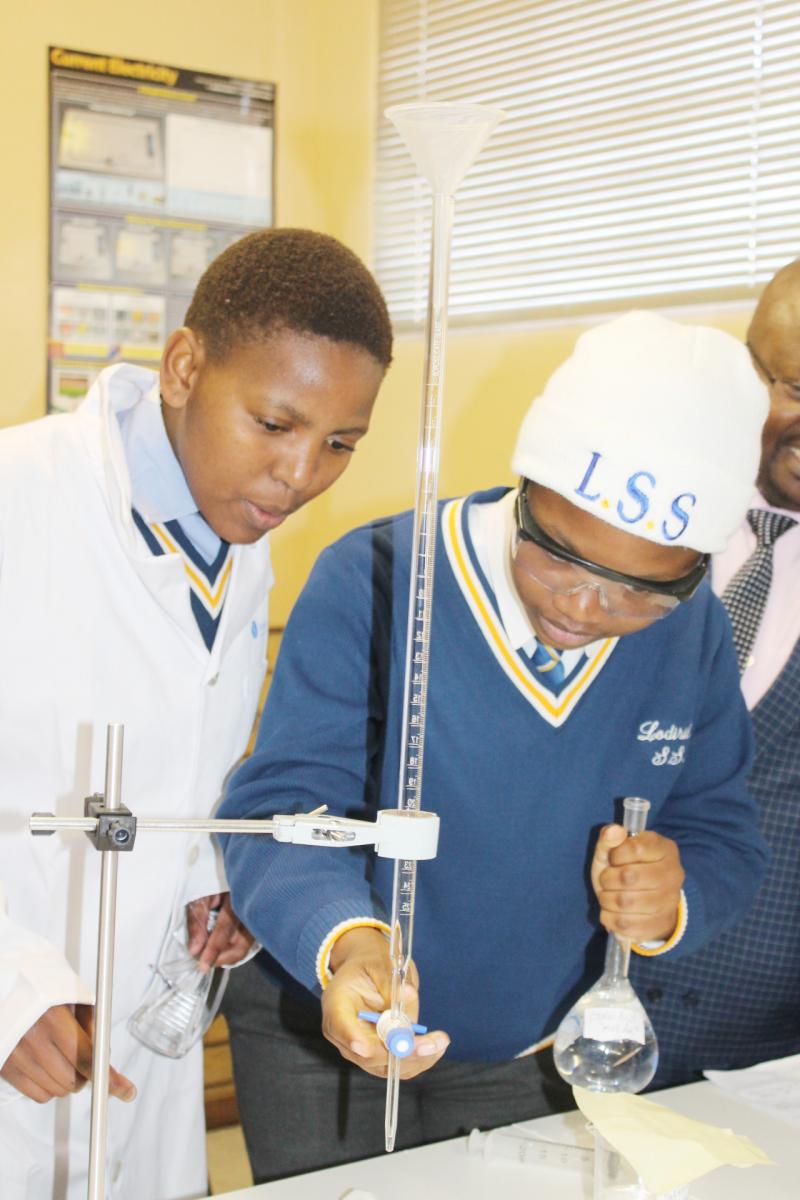 Pupils from Lodirile Secondary School in Rietvlei, west of Johannesburg, will be able to put science theory into practice thanks to a new science laboratory.
Pupils from Lodirile Secondary School in Rietvlei, west of Johannesburg, will be able to put science theory into practice thanks to a new science laboratory.
The lab is a donation from the West Rand District Municipality and CONLOG, an electric metering company based in KwaZulu-Natal. CONLOG identified the school as one of its 2017 corporate social investment beneficiaries, based on a needs analysis.
The new facility will go a long way towards changing the face of science studies at the school, according to principal Mlanga Litshiyane.
“Previous to this our learners were exposed to more theory and had to rely on their imagination, especially when taught that mixing certain chemicals results in a colour changing to green or blue.” She is proud that those days are a thing of the past and that the learners are now in a better position to excel in science.
“This lab means a lot to us. It will certainly assist in enabling the school to produce more science learners,” Litshiyane added.
Encouraging the study of science
The school will ensure the lab is utilised efficiently and hopes it will influence other learners to take up the subject and not be discouraged by the previous lack of resources. The teachers were given two days training on how to use the lab effectively.
The laboratory is CAPS approved – it complies with the Department of Basic Education’s Curriculum and Assessment Policy Statements – and includes all apparatus, furniture and skeleton models and other items.
Grade 12 pupil Aviwe Luthuli is happy about the lab: “I’m sure I speak for everyone when I say we are thrilled to have such facilities.
“I’m quite confident about this space as it will expose us to things we didn’t know before and learning will be much easier.
“It will be a great platform for all science learners,” Luthuli added.
West Rand District Mayor Boyce Maneli said the laboratory will improve the quality of science education at the school – over the years, the school’s results have never been less than a 90 per cent pass rate, and mathematics and science formed the core of these results.
“This is a testament that even in township schools we can produce good results in maths and science,” Maneli said.
Plan to break cycle of economic dependence
Plan to break cycle of economic dependence LondekileTwo Western Cape provincial departments have partnered in a ground-breaking women empowerment initiative. 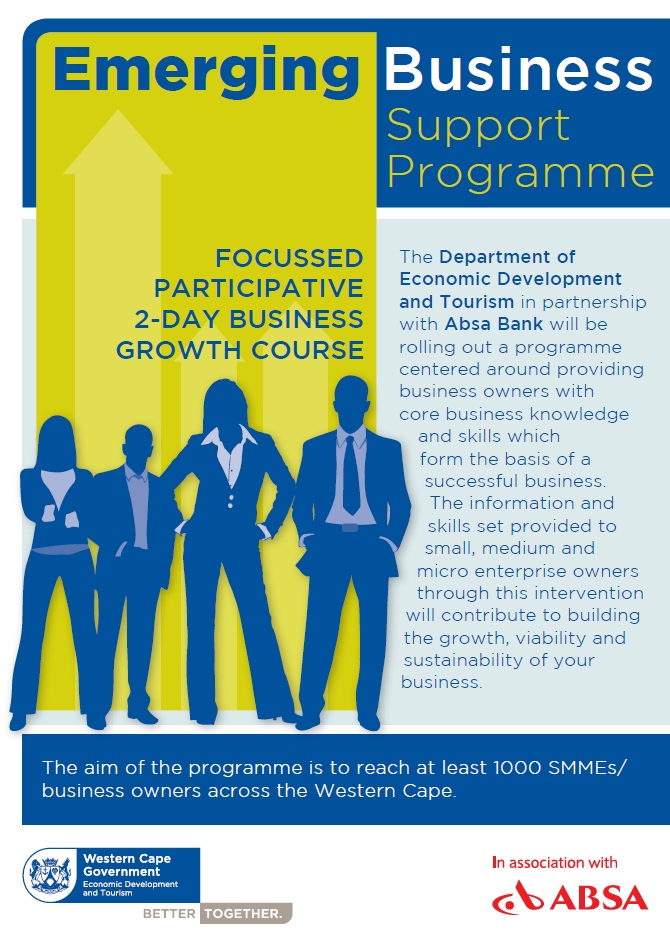
Two provincial departments are working together to give abused women a chance to create economic opportunities for themselves.
The Women’s Empowerment Initiative run by the Western Cape departments of social development and economic opportunities will begin providing skills training and economic opportunities to 310 women presently housed in 16 women’s shelters.
Speaking at the Sisters Incorporated Shelter in Cape Town, Economic Opportunities MEC Alan Winde said the province wanted abuse victims to become economically independent from the people who were abusing them. “We will achieve this by empowering women with skills and training that enables them to find employment or start their own businesses.”
Providing support and skills
The initiative will add to the work of shelters in providing a safe space for women to escape abuse and rebuild their lives. It will be through this network that the province will give them access to training and business opportunities, through the Victim Empowerment Programme.
As the programme grows, MEC Winde says he hopes it can be used to encourage other women to seek assistance. “Through this initiative, I would like to see us connecting more residents to facilities such as our Barn Khayelitsha and the ICAN [Interactive Community Access Network] centre in Elsies River.
“To ensure that aspiring businesswomen have access to the support they need, we will also link them to our Emerging Business Support Programme (EBSP). It is my hope that we are able to make a meaningful difference in the lives of the women and their families,” Winde said. The EBSP is a two-day course covering business strategy, operations strategy and financial literacy development.
Potter moulds a brighter future
Potter moulds a brighter future LondekileAs a young girl in Makhado, Limpopo, Lillian Malange learnt the traditional art of clay pot making from her grandmother and mother. Today her company, Rainbow Mosaic and Ceramics, exports her pots around the world.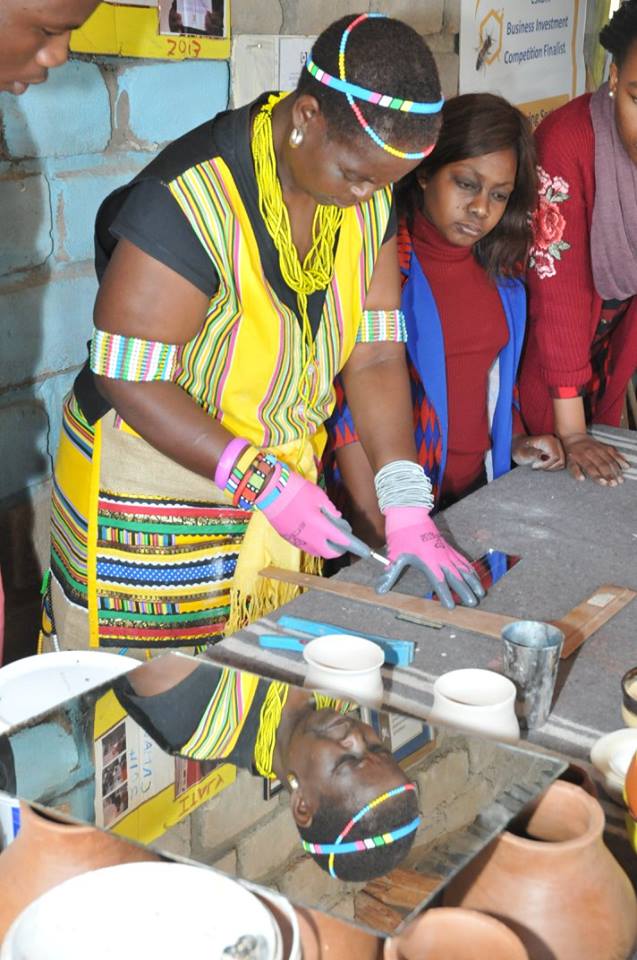
Using the methods that Venda women passed down to their daughters, Malange started her business after winning Eskom’s Business Investment Competition. Using pebbles, mirrors and the rich Venda clay, Malange showcases Limpopo’s natural beauty to the outside world.
For some international customers, Malange’s pots are important keepsakes and an introduction to the beauty of the country. “In 2013 when Nelson Mandela died, I was in Italy. I had stock worth R18 000 and it sold out immediately.”
Offering something authentic
In a part of the country without many economic opportunities, Malange and the women she has trained are benefitting from the increase in tourism to this often overlooked part of the world. “Tourism is growing in Limpopo. South Africans and many others are learning that there is so much more to see and experience across the province and my business offers them something authentic and modern from their time in Limpopo.”
Her intricate and traditional pots are sold in China, Italy, Botswana, Portugal, Zimbabwe and America. Malange’s company is one of the Eskom empowerment programme’s biggest successes. That Malange is able to export and show off Limpopo’s natural beauty is a direct result of her winning the power utility’s investment competition.
For the utility’s Development Foundation, giving small businesses like Rainbow a helping hand makes perfect sense. As the foundation’s acting CEO Cecil Ramonotsi explains, “Small black-owned businesses can make a big difference to our economy. By enabling these businesses to create products and services that will strengthen local economies, we can help small businesses unlock economic opportunities and contribute to inclusive growth.”
Malange believes that it is her responsibility to share her good fortune with her community. Besides teaching ceramics to women, who then earn a living making pots, Malange hosts children after school and during school holidays. “It would be nice if Eskom could help me set up a studio so I can teach children to create their own artwork.”
Provincial Indigenous Games preserve rich heritage
Provincial Indigenous Games preserve rich heritage JoyThe King Cetshwayo District, in northern KwaZulu-Natal, took top honours in the recent regional 2017 Indigenous Games held at the Kandahar Sports Ground in Ladysmith.
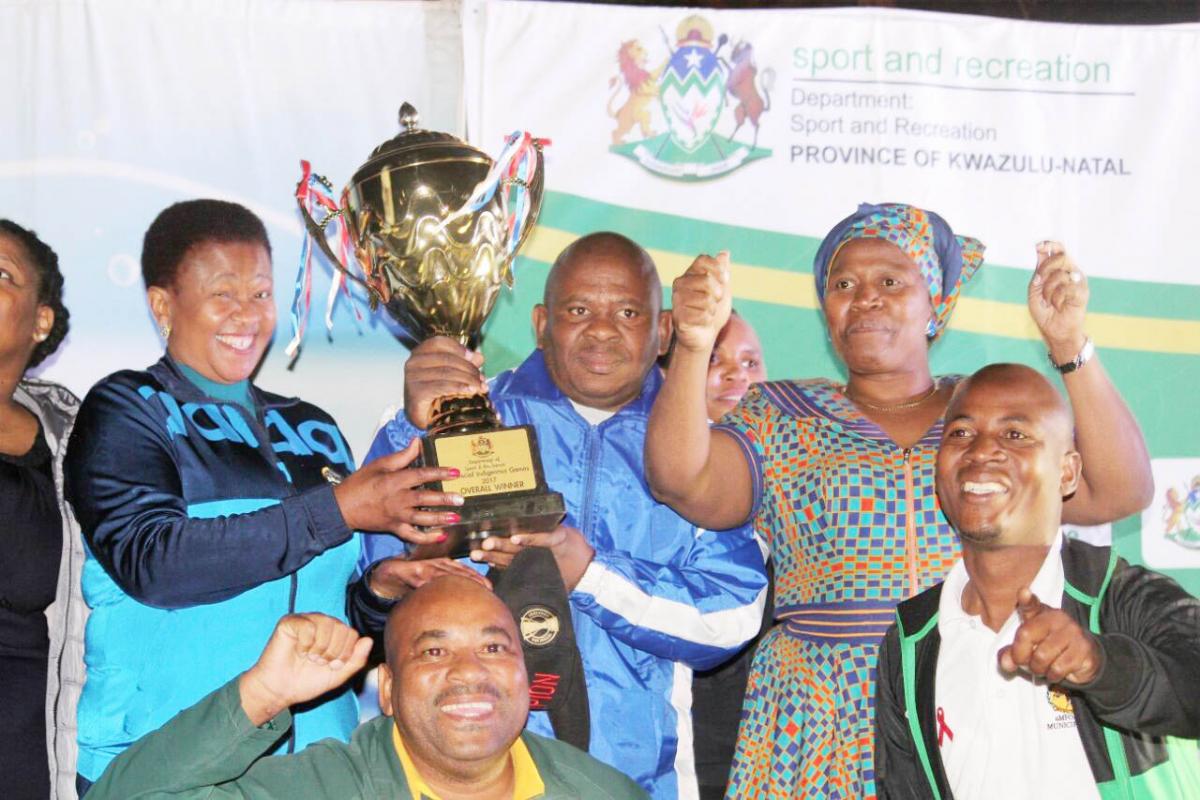 King Cetshwayo District was crowned champions with 22 points, followed by the Umgungundlovu District on 17 points and the eThekwini Metro with 16 points.
King Cetshwayo District was crowned champions with 22 points, followed by the Umgungundlovu District on 17 points and the eThekwini Metro with 16 points.
A provincial team will now be selected to take part in the National Indigenous Games taking place in Limpopo this month.
All 11 KwaZulu-Natal districts went head-to-head in the thrilling regional event, fighting for the number one spot in various disciplines, including ingqathu (rope skipping), induku (stick fighting), drie stokkies, khokho, dibeke, juskei, amagende (stones) and the board games of umlabalaba and incuva.
“You are all winners,” said Arts, Culture, Sport and Recreation MEC Bongi Sithole-Moloi, congratulating everyone for taking part.
A rich history
“The games are very important to us as they preserve our rich history and heritage.”
The MEC hoped that the team selected to represent the province in the national games would “once again do us proud as you have in previous years”.
“I feel very excited and honoured that I was selected to represent my district,” said Thobile Gumede, an induku player from the Umkhanyakude District. “It’s not every day that one is afforded such an opportunity and I am grateful for the chance.”
Manqoba Ngwenya from the Umgungundlovu District was pleased with the improvements of the games compared to previous years, urging young people to participate in games such as umlabalaba. “Last year I went to the games held in Indonesia and my dream came to fruition.”
Results
First: King Cetshwayo District (22 points)
Second: Umgungundlovu District (17 points)
Third: eThekwini Metro (16 points)
Fourth: Amajuba District (12 points)
Fifth: Umkhanyakude District (7 points).
Qunu farmers sell first harvest
Qunu farmers sell first harvest JoyEmerging farmers in Nelson Mandela’s home village of Qunu in the Eastern Cape have sold their first vegetable harvest.
The farmers, who were among several recipients, were given vegetable seedlings by the Department of Rural Development and Agrarian Reform as part of International Nelson Mandela Day last year.
Seedlings were also given to the Nelson Mandela Nomoscow Primary School, the Emba and Upper Qunu Junior secondary schools and the Anglican Church to plant 67 plots in Qunu.
The project was not without challenges, but the department did not lose hope. In March this year, it provided a further 2 400 cabbage, beetroot, spinach and onion seedlings to the villagers to continue the food security programme, set up to fight poverty.
The farmers from the 15 households reaped their hard-earned reward; the seedlings helped increase the size of the harvest, and selling their extra produce gave them a good income to provide for their families.
The first harvest was sold to the Mthatha Kei Superspar in July.
Massive savings for poor households
Speaking from his garden a stone’s throw away from Mandela’s home, local farmer Koko Nkunzi said: “Vegetables quickly end poverty and, unlike maize, give you quick produce. They have a good and quick turnover and it doesn’t take a long time to harvest.”
Nkunzi said the programme helps them produce their own food and have vegetables left over to sell. “Selling our produce to Spar motivates us … had we started long ago we would be far by now,” he said.
Farmer Nothemba Bhakraza said the contribution from the Government has changed her life for the better. “We eat some of the vegetables and I sell spinach to local households. The contribution from government is improving my life because I no longer buy vegetables from the shops. I buy a few things and mix them with my vegetables to prepare good food for my family.”
When food prices increase she doesn’t feel the pinch too much, she added. Based on current retail prices, a family like Bhakraza’s, which consumes two bunches of spinach and one cabbage per meal, for 15 days per month, saves R570 on groceries every month.
The widow, a mother of seven and grandmother of one, said her old-age grant and the profit she makes from selling vegetables are the only sources of income she has.
Retailer lauds quality
Jessica Venter from Kei Superspar praised the quality of the vegetables from the Qunu farmers. “We will help these farmers by buying their produce. The produce is very fresh, sells at competitive prices and customers are responding very well,” said Venter.
Eastern Cape Rural Development and Agrarian Reform MEC Mlibo Qoboshiyane said his department decided to broaden the food security programme to the broader community. “We will give them more seedlings and help them improve their irrigation infrastructure to increase their produce,” said Qoboshiyane.
“I am happy to see these farmers selling their produce to retail stores and local households. I see this is not new to them. They are passionate about agriculture.”
SADC’s top journalists
SADC’s top journalists lebangJournalists are uniquely placed to help empower the people of the region, says Minister of Communications Ayanda Dlodlo.
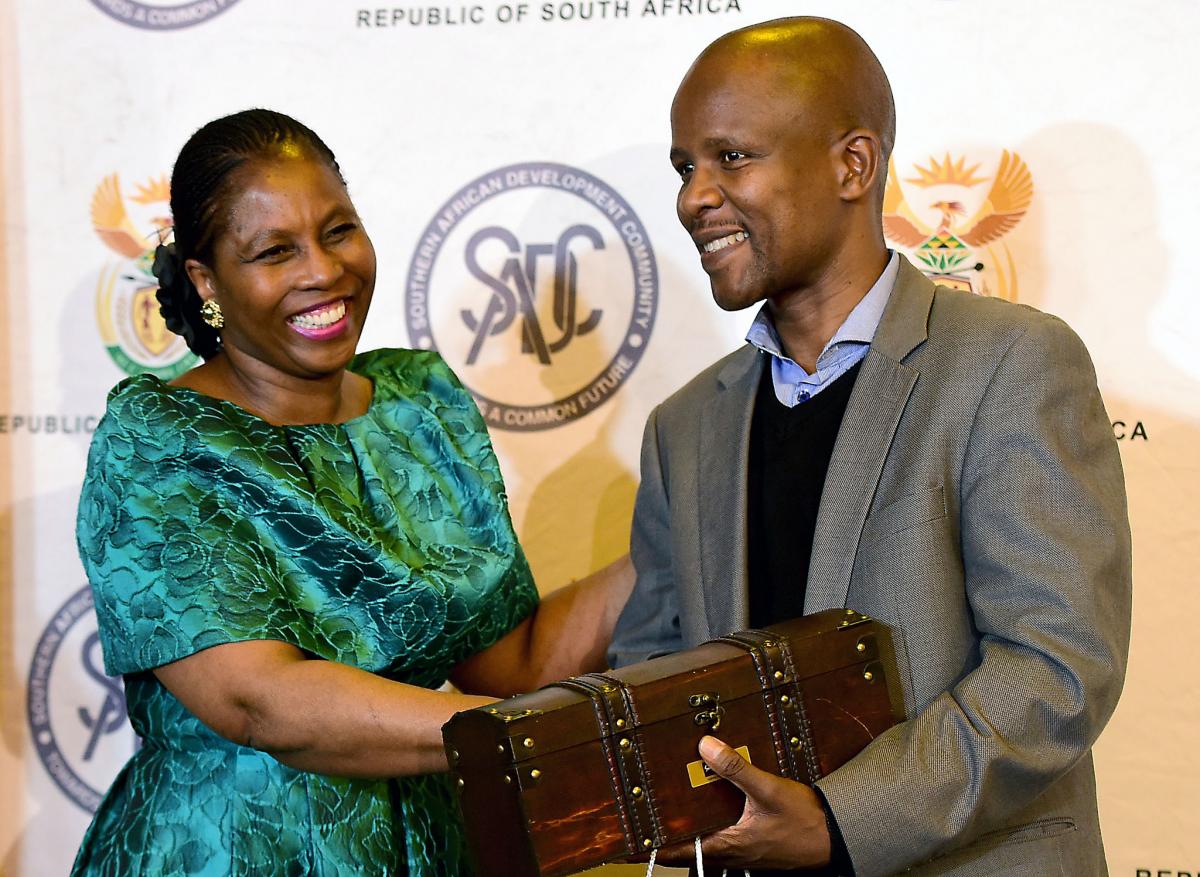 Journalists, she went on to say, can help build a common, growing and integrated future for the region.
Journalists, she went on to say, can help build a common, growing and integrated future for the region.
The minister was speaking at the Southern African Development Community (SADC) Media Awards dinner held in Tshwane recently.
“What better way for regional integration than the sharing of our own good stories that contribute towards regional integration – communicated in the languages that our people speak and in a manner they understand.”
The winners of this year’s SADC Media Awards were announced at a dinner held on the sidelines of the 37th SADC Summit. The awards celebrate the exemplary work of African journalists telling African stories in print and on radio and TV.
South African television journalists Msibi Nkosini Samuel and Dennis Tshetlhane shared the US$2 000 first prize in the TV category for their story on the illicit trade in minerals and the growing problem of illegal mining in South Africa.
Tshetlhane said journalists need to concentrate on the quality of the work they produce. Drawing on his two decades as an investigative journalist, he reminded fellow members of the media: “Always focus on excellence. Check your facts and get your story right.”
Zambian journalist Patson Phiri was awarded the top prize in the print category for his story on improvements to energy supply and how this is improving the region’s industrial economy. “It is very important that we, as journalists of the southern African region, tell our own stories. Many times, we are engulfed in news packaged by foreign news agencies, and the verge of distortion and the appetite for distortion is quite high. As a result of that, the world is misinformed on what takes place in the region,” said Phiri.
Angolan Aristides Kito Afonso Jorge was the winner in the radio category for his reporting on the importance of conservation and the protection of cultural heritage. Photographer Gaseitsiwe Moruakgomo of Botswana took home the photography prize for his series on the ferry transport link between
Botswana and Zambia at Kasane.
SAPS steps up to help victims of gender-based violence
SAPS steps up to help victims of gender-based violence LondekileThe South African Police Service has a six-point plan to help women and children report abuse and violence.
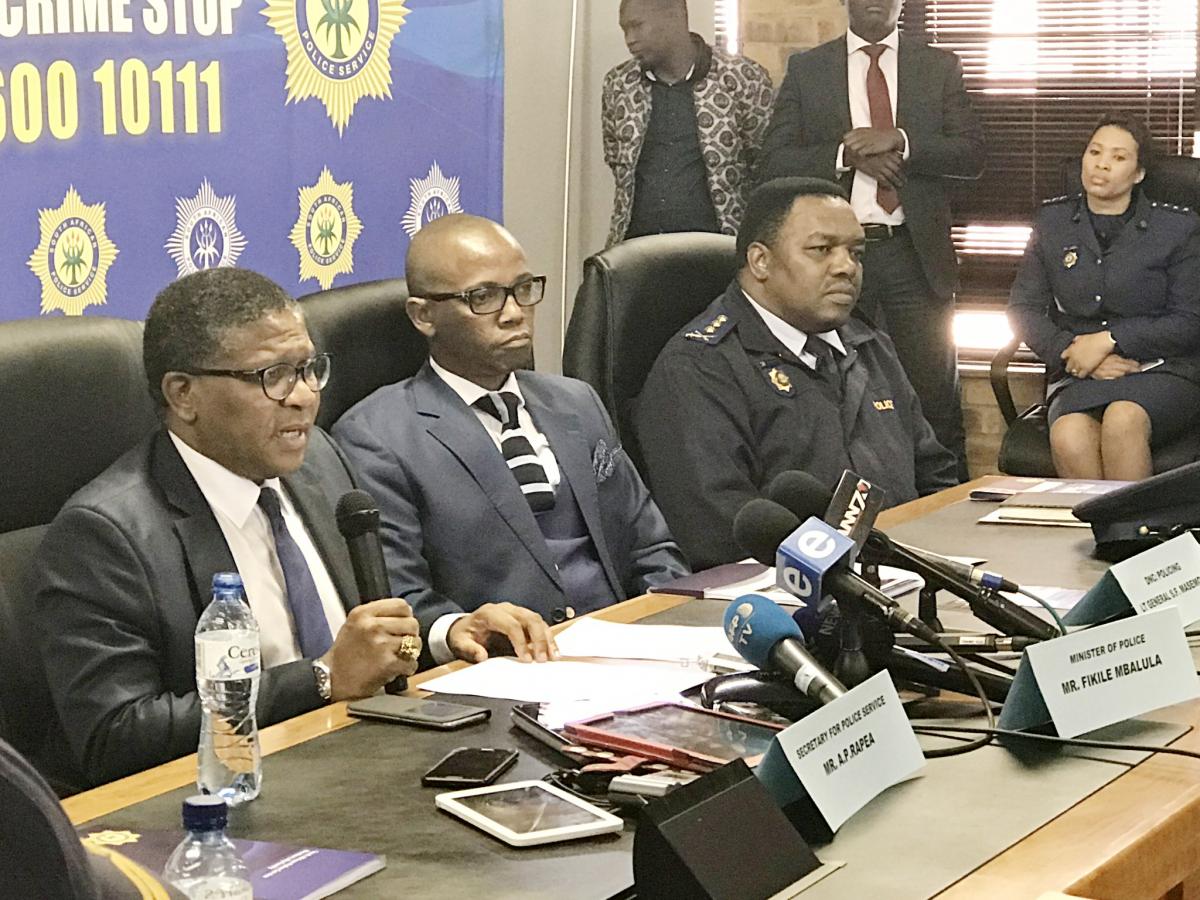 Minister of Police, Fikilie Mbalula, recently launched a South African Police Service (SAPS) policy to make it easier for victims of gender-based violence to turn to the police for help – ensuring that women will no longer be turned away from a police station with advice to be nicer to her husband or boyfriend.
Minister of Police, Fikilie Mbalula, recently launched a South African Police Service (SAPS) policy to make it easier for victims of gender-based violence to turn to the police for help – ensuring that women will no longer be turned away from a police station with advice to be nicer to her husband or boyfriend.
The policy ‘Reducing Barriers to the Reporting of Sexual Offences and Domestic Violence’ is being rolled out nationwide and will guide all SAPS interventions when dealing with incidents of sexual violence and domestic abuse.
Minister Mbalula hopes that comunities and victims will now be able to hold the police accountable for their response.
“In the policy there are a host of interventions to prevent and deter crime, as well as respond appropriately and compassionately to victims of violence. This policy says we at SAPS have a role to play. We have a critical role in creating safer communities and providing a platform for communities.”
Speaking at the launch of the policy in Eldorado Park, the Minister said that not reporting these crimes means that too many men are getting away with crimes against women.
“We must not re-humiliate or re-victimise people at our police stations. We must make sure each police stations has a victim friendly room. No victim must be sent away from a police station without a case being opened and a proper interview. We need not see bruises to open a case.”
The six-point plan
- All victims should be treated with respect and dignity and interviewed by a trained police official in a victim sensitive manner.
- Victims should be assisted in a victim friendly or alternative room, where a statement will be taken in private providing victim support services.
- Victims will be referred/taken for medical examination by the healthcare professional to obtain medical evidence and complete a medical report, including seeing to the health of the victim.
- The investigation should be conducted by the Family Violence, Child Protection and Sexual Offences Investigation Unit or a detective with relevant training.
- Victims of sexual offences, femicide and infanticide and their families should be referred to victim support services that are available within the precinct for legal, medical, social and psychological help.
- Victims should be proactively and continuously given feedback on the progress of their cases.
- Gender-based violence helpline: 0800 150 150
- Gender-based violence command centre: *120*7867#
South Africa has rich heritage
South Africa has rich heritage LondekileDuring September South Africans are reminded to explore their country and appreciate and conserve the natural and cultural heritage that make the country a fascinating and popular tourist destination.
Every September we celebrate Heritage Month and Tourism Month in South Africa, bringing together government, community members, cultural organisations, the tourism industry and our esteemed traditional leadership in showcasing our rich and unique cultural heritage, among other things.
Commemorating Black Consciousness
A critical highlight of our Heritage Month this year will be the 40th anniversary of the tragic death of Steve Bantu Biko at the hands of apartheid security officers.
Biko was the leader and founder of the Black Consciousness Movement which contributed immensely to influencing black pride, self-reliance and the need for black people to be their own liberators. The concept of Black Consciousness entails understanding and embracing blackness in its own terms outside of the social descriptions imposed on it by the dominant white and often anti-black world.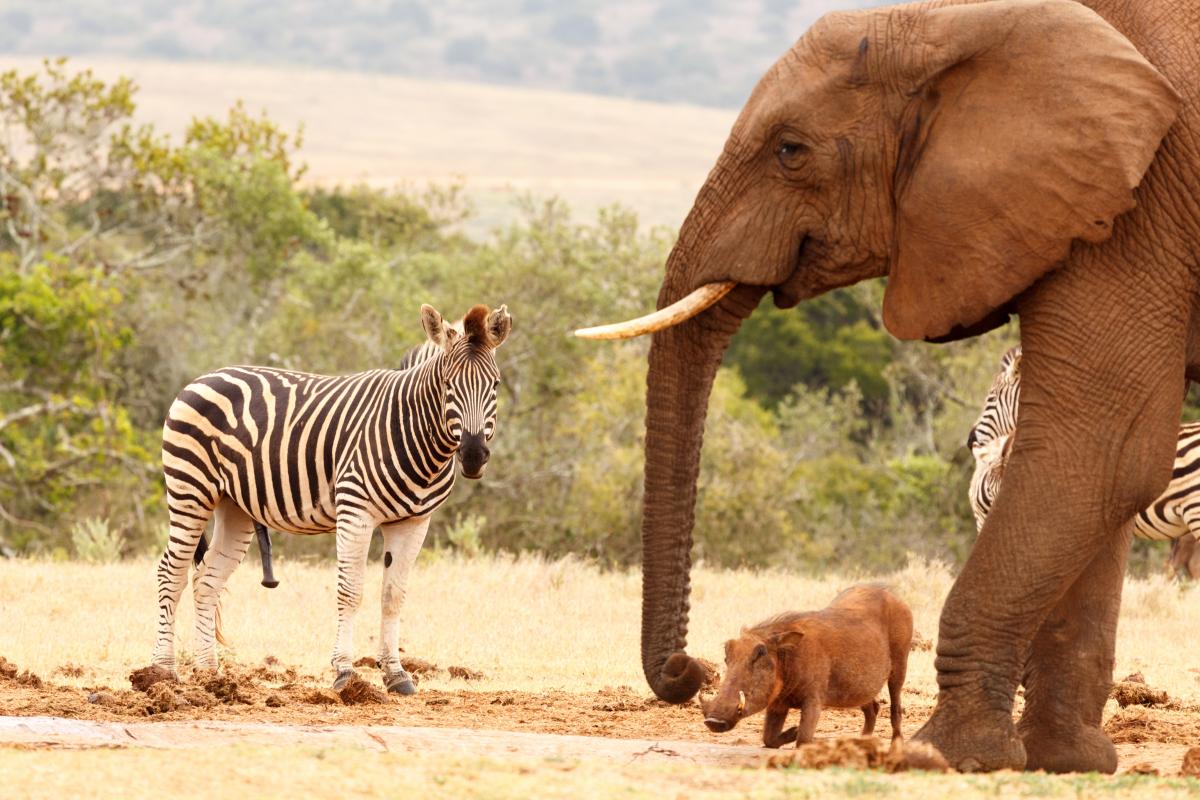
Biko died on 12 September 1977 in a police cell from injuries sustained during his imprisonment and torture. His life and activism symbolises the history of the liberation struggle in South Africa in response to oppressive colonialism and apartheid. Government will host the national commemoration in Pretoria on 12 September.
The commemoration of the death of Steve Biko coincides with centenary celebrations honouring Oliver Reginald Tambo, the icon of our struggle for liberation and freedom. Together, these two heroes should ignite public consciousness of issues of decolonisation as well as debates on radical economic transformation across the country.
We will use the Biko commemoration to raise public awareness and understanding of the black consciousness philosophy as a key strand of thought for societal transformation. We believe that the advent of democracy and freedom has brought about profound changes in our society and liberated voices previously silenced for decades. South Africans are now able to tell stories about their trials and tribulations during the dark days of apartheid.
Contribute to tourism in our country
September is also national Tourism Month. During this time, government intensifies its support for tourism and, together with the private sector and communities, encourages all South Africans to tour their own country. That is precisely the purpose of our WE ALL DO TOURISM national campaign which we launched in May this year during the Tourism INDABA 2017 in Durban.
We will continue to work with all social partners across the tourism value chain as well as our citizens to inspire them to play their part and contribute to tourism in our country.
It is also during this time that we combine our efforts to preserve all that is valuable and distinct about our different cultures, individual practices as well as historical and natural treasures. We also use this time to embrace all our heritage institutions.
We will be embarking on many campaigns nationally and locally to encourage one another and our visitors to explore our country and its beautiful ecosystems, wildlife, mountains, cultural villages, landmarks (statues and monuments), indigenous sites and various activities and practices that make us unique and make our country one of the world’s more popular tourist destinations.
Within our communities we have, unique cultural practices, rituals, rites of passage, and other activities that are presided over by cultural activists and by our esteemed traditional leadership. These practices and activities are quite significant in ensuring that the social and cultural fabric of our communities remains tightly woven. They also serve as reservoirs of knowledge and wisdom that promote positive values in communities.
In promoting nation building, it is important for community members to visit our modern institutions such as museums, galleries, libraries, cultural villages and heritage sites and engage in activities there for them to gain a deeper understanding of our history and heritage.
We will continue our endeavours to make these various institutions accessible to all South Africans. As the custodians of our culture, community members must also ensure that these institutions are safeguarded for future generations so that cultural teachings can remain preserved.
Share knowledge and wisdom
As a country, we have witnessed a welcome increase in the number of cultural villages where indigenous groups portray their daily way of life, allowing visitors to learn about their culinary traditions, dance, harvesting, as well as indigenous clothing, arts and crafts and other cultural heritage practices.
The Tsonga Kraal Museum, Lesedi Cultural Village, Pedi Cultural Village, Ndebele Cultural Village, Basotho Cultural Village, and Shangaan Cultural Village are examples of such villages.
They have attracted the attention of cultural enthusiasts at home and abroad which has contributed significantly to the development of a now thriving cultural tourism industry. They also play an important role in the economic empowerment and development of skills in our people.
We should also explore the importance of community dialogues where we create a platform for knowledge-holders and legends to share their knowledge and wisdom. These dialogues will go a long way towards preserving, showcasing and promoting our vibrant heritage.
South Africa is also home to nine of the world's official United Nations Educational, Scientific and Cultural Organisation heritage sites, namely: Robben Island; iSimangaliso Wetland Park; the Cradle of Humankind; Maloti-Drakensberg Park; Mapungubwe Cultural Landscape; the Cape Floral Region Protected Areas; Vredefort Dome; Richtersveld Cultural and Botanical Landscape, as well as the ‡Khomani Cultural Landscape which was announced in July.
We are also proud to possess a unique heritage arising from the political and cultural struggles for a non-racial, non-sexist, democratic and united South Africa in which all citizens live freely and equally.
In this Heritage Month, we wish to encourage and inspire communities to proudly embrace diverse cultures, practices and heritage institutions. It is our constitutional responsibility to support cultural diversity and to promote the development and expression of excellence in all of this country’s different cultures.
We also encourage all South Africans to tour their country and know more about our cities and provinces. We must all DO TOURISM!
This month in history - Sep 2017
This month in history - Sep 2017 JoySteve Biko dies in police custody
Bantu Stephen Biko, pioneer of the Black Consciousness Movement, died in police custody on 12 September 1977 at the age of 30.
Biko worked tirelessly to end apartheid rule, becoming a leader in the South African Students’ Organisation and helping set up the Black People’s Convention. Due to his activism, the apartheid government issued him with a banning order in 1973, and he was detained on several occasions.
On 18 August 1977 Biko was arrested on the outskirts of Grahamstown. During his incarceration he was stripped and manacled.
Sometime during the night of 6 September Biko was badly beaten, sustaining a brain haemorrahage. Despite his injuries, he was kept chained to a grille. Doctors brought in to examined him glossed over his injuries.
On 11 September the police decided to transfer Biko to a prison hospital in Pretoria, a 12-hour 1 133km journey. He was transported at the back of a police Land Rover, naked and shackled.
Biko died alone on the floor of the cell some time during the night of 12 September.
Some 20 000 people attended his funeral, held on 25 September in the King William’s Town.
Biko was the 46th person to die in detention. His death drew worldwide condemnation of South Africa's detention practices and repressive laws.
Source: South African History Online – www.sahistory.org.za
Three little words creating a safer community
Three little words creating a safer community lebangKwaNdengezi, outside Durban, is a community of 54 000. It is a collection of brick buildings and self-built homes of zinc sheeting, recycled bricks and wood. Roads do not have names and unless you live in the sprawling 14km² township, it is easy to get lost.
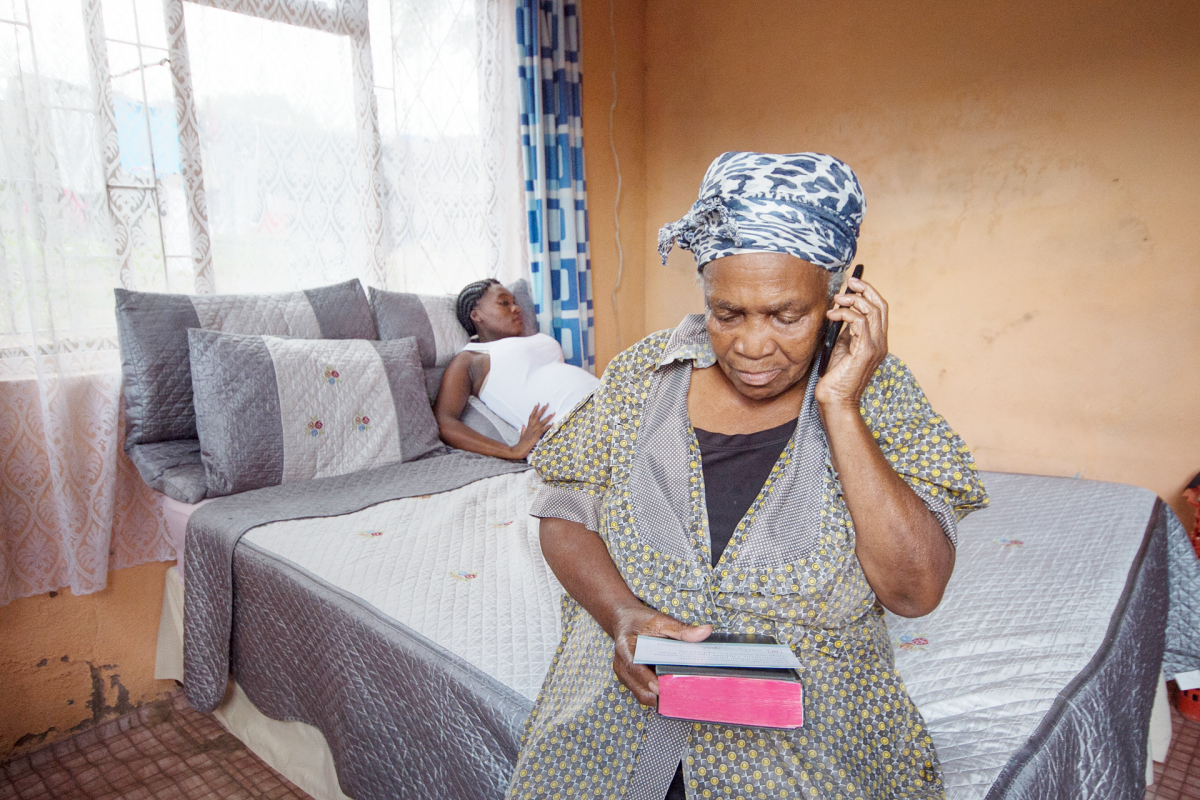 As Thembinkosi Lesley Dladla, an Emergency Management Rescue Services (EMRS) shift supervisor, explains: “As an EMRS [officer], my work doesn’t have any boundaries – we work the whole of Durban. It’s very difficult in the townships, because they don’t have road names written, and they also don’t
As Thembinkosi Lesley Dladla, an Emergency Management Rescue Services (EMRS) shift supervisor, explains: “As an EMRS [officer], my work doesn’t have any boundaries – we work the whole of Durban. It’s very difficult in the townships, because they don’t have road names written, and they also don’t
have house numbers.”
Ambulances can take hours to reach patients. Often a whole day will pass before an ambulance can find patients. They, as well as community health workers, have to rely on residents to give them directions. For the community, descriptive directions are the easiest ways to navigate the chaotic streets of the township.
Making use of global mapping
A local health NGO, Gateway Health Institute, is piloting a project in KwaNdengezi that will map the entire township. For the first time residents will have an address they can use when calling for medical help.
The NGO is using what3words, a global online mapping system, to create unique addresses for the township. The system breaks the globe into a grid of 57 trillion 3m x 3m squares. Each has a pre-assigned and fixed three-word address.
Gateway’s fieldworkers helped residents identify their locations on a satellite map and then printed their three-word addresses on plastic signs that were attached to their homes. The addresses are registered in a database, and the NGO is able to identify what medical services are needed where.
The mapping service has helped to increase the number of pregnant women receiving home visit antenatal care. When medical help is needed it can be dispatched to a mapped location and ambulance crews know where to go to provide life-saving assistance.
Beyond providing addresses to homes in KwaNdengezi, Gateway is also working with the Kwazulu-Natal Department of Health mapping community assets such as local government centres, clinics and pumps that provide clean drinking water. The aim is to build a detailed map for the residents that can be used by businesses and the government to improve the lives of the community.
The project was begun by Dr Coenie Louw, founder and director of Gateway.
Addressing a problem
Gateway runs community health services in disadvantaged communities across the country. The most important medical services it offers are delivery of medicines and emergency transport for women in labour: 50 per cent of births in KwaNdengezi take place at home. Before the project began an ambulance could take up to four hours to reach a woman in distress.
At first, Louw tried using phone masts to triangulate locations. “I spent two years trying to find a way to actually pinpoint the location of a pregnant woman in distress.”
The project is also being used to alleviate unemployment in the township — 11 previously unemployed youngsters were trained as fieldworkers to help residents identify their addresses and to help load location and health information on Gateway’s database.
Women farmers make a difference in Eastern Cape
Women farmers make a difference in Eastern Cape lebangAfrica’s first cashmere fabric manufacturer won the highly-coveted overall prize in the Eastern Cape’s Female Entrepreneur Awards (FEA) recently.
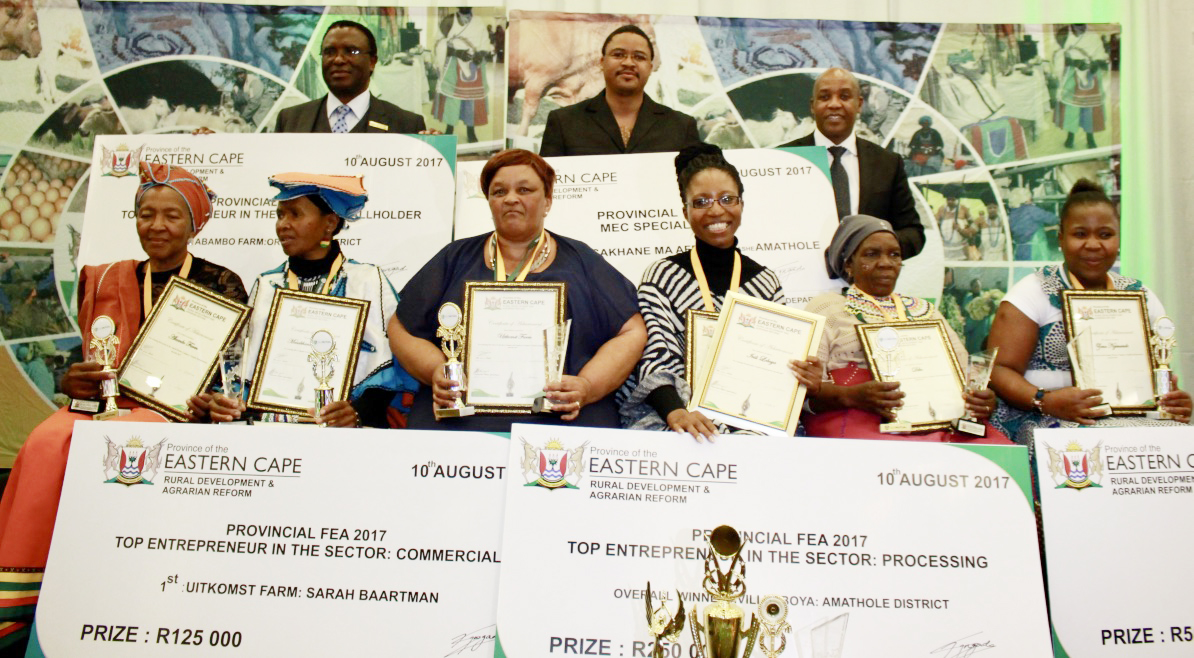 Dr Vuyo Mahlati started Ivili Loboya near Butterworth in the Eastern Cape in 2015. Just two years later, Ivili’s high-end hand-woven and knitted natural blended fabrics are now internationally sought for décor, upholstery and fashion apparel.
Dr Vuyo Mahlati started Ivili Loboya near Butterworth in the Eastern Cape in 2015. Just two years later, Ivili’s high-end hand-woven and knitted natural blended fabrics are now internationally sought for décor, upholstery and fashion apparel.
Among the textiles produced by the beneficiation enterprise is cashmere from the local iMbuzi goat.
The annual FEAs recognise the strides made by women in agriculture. Farmers are selected based on their performance, sustainability of their farming and the commercial trading they do.
The Eastern Cape leg of the awards was hosted by the provincial Department of Rural Development and Agrarian Reform in East London on Women’s Day.
Creating local markets
Ivili has had a positive impact on the largely rural economy in which it operates, not only creating 30 jobs but giving local goat and sheep farmers a market for their wool.
Apart from making a name for itself in South Africa, Ivili Loboya has a footprint in Europe and China.
Said company representative, Sibukele Gumbo: “We are so happy to have won this award. It encourages us to work harder so our work can be recognised everywhere.”
Uitkoms Farm won the top prize in the commercial producer category. Chairperson Sarah Louw said the farm breeds angora goats for their mohair.
“We are very grateful because government, in the first place, helped us by buying us goats and we got the farm from (the Department of) Land Affairs,” Louw said.
“We should all try to develop ourselves. We come from poverty and those of us who get farms from government should strive to better our lives and grow our businesses to be able to employ others. We should desist from selling the equipment we get to scrap metal traders.”
Turning a vision into reality
MEC for Rural Development and Agrarian Reform Mlibo Qoboshiyane commended the farmers on their high standards. “It shows that people are learning farming expertise and the standard is improving.”
Premier Phumulo Masualle said the calibre of the entrants showed that the vision of turning the Eastern Cape into a food basket of the country was taking shape.
“The women here show us they are implementing the vision it on the ground.” Government needed to support their efforts to upscale what they are capable of doing, he added.
“Women are not just at the primary production level, and they are also in the production space, converting some of these products into finished goods.”
Women scientists recognised
Women scientists recognised lebangThe full scientific potential of South Africa will only be realised when all our young women are able to enjoy access to the best facilities and education, says Minister of Science and Technology, Naledi Pandor.
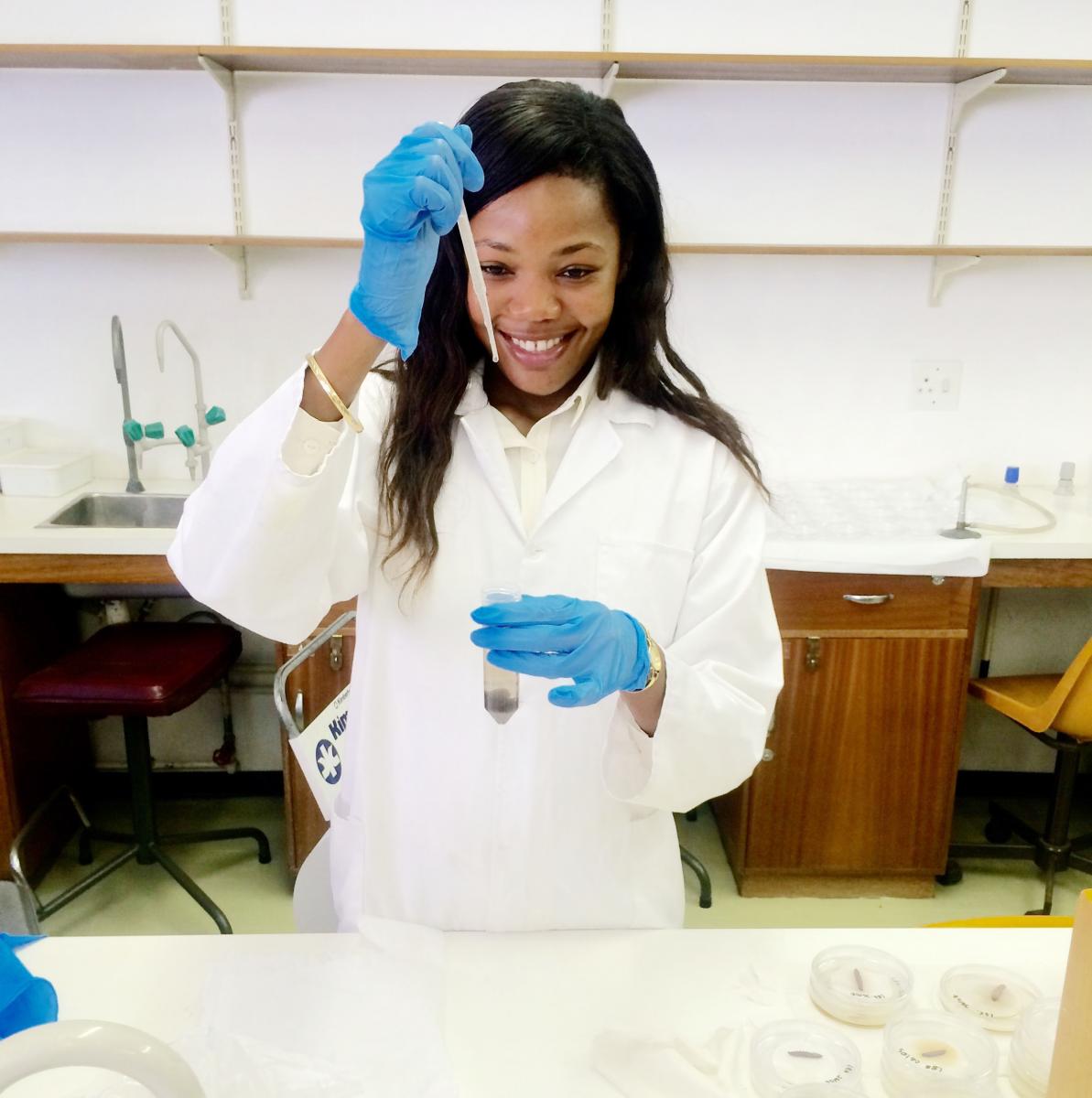 The minister was speaking at the 2017 Women in Science Awards held in Sandton recently. The awards, presented for the first time in 2003, recognise and reward leading female researchers and scientists.
The minister was speaking at the 2017 Women in Science Awards held in Sandton recently. The awards, presented for the first time in 2003, recognise and reward leading female researchers and scientists.
In her welcome message, Minister Pandor said that the awards showed that women can excel in science and research, even while balancing the demands of career and family.
“The awards are a reminder that the full scientific potential of our country will only be realised when all our young women are able to enjoy access to the best facilities and education,” she added.
This year’s keynote address was delivered by Dr Nolulamo Gwagwa, the chief executive of Lereko Investments. She said that the women recognised by the awards, via nomination or receiving an award, are role models for young girls and boys, and the continent’s future depends on young people who follow their role models into innovative and technology-driven careers.
A brighter future for Africa depends on more women becoming involved in sectors linked to technology and innovation. Dr Gwagwa challenged the audience to encourage young girls not to give up on their dreams of choosing careers based on STEM (science, technology, engineering and maths) subjects. Young girls need to be encouraged to be ambitious. “We must tell young girls driven by burning ambition that it is okay and natural for women to be ambitious.”
Reseacher and mentor
Among the list of impressive winners was Dr Tiisetso Lephoto, a researcher at Wits.
Her research covers the fields of microbiology, biotechnology, genomics, nematology and bioinformatics.
She is also passionate about youth development, and spends her spare time mentoring high school students through the Katleho Pele Education Foundation.
“My vision is to change the world. I started a project called Yes We Are Moving, where I host aerobic marathons to collect clothes, food parcels and books for orphanages. I also provide nutritional advice and physical training through Tii-Moves, my fitness and wellness project.”
Her research and charity work complement each. She is trying to find natural ways to control pests in agriculture. “That’s the healthier way of killing insects, without harming people or animals in any way. Through TiiMoves I encourage people to put nutrition with exercise, and feel good in their own skin.”
While her research is fulfilling, she believes that giving back to the community makes her a more rounded person. “I believe the higher you go, you have to find a way to lift other people with you. It’s very fulfilling to share knowledge, to help someone, and then see them succeed.”
iDube Cold Storage adds value to agro-processing chain
iDube Cold Storage adds value to agro-processing chain lebangA new, multipurpose state-of-the-art cold storage facility, costing R99.2 million, was officially opened in the Dube Trade Port Special Economic Zone (SEZ), in KwaZulu-Natal recently.
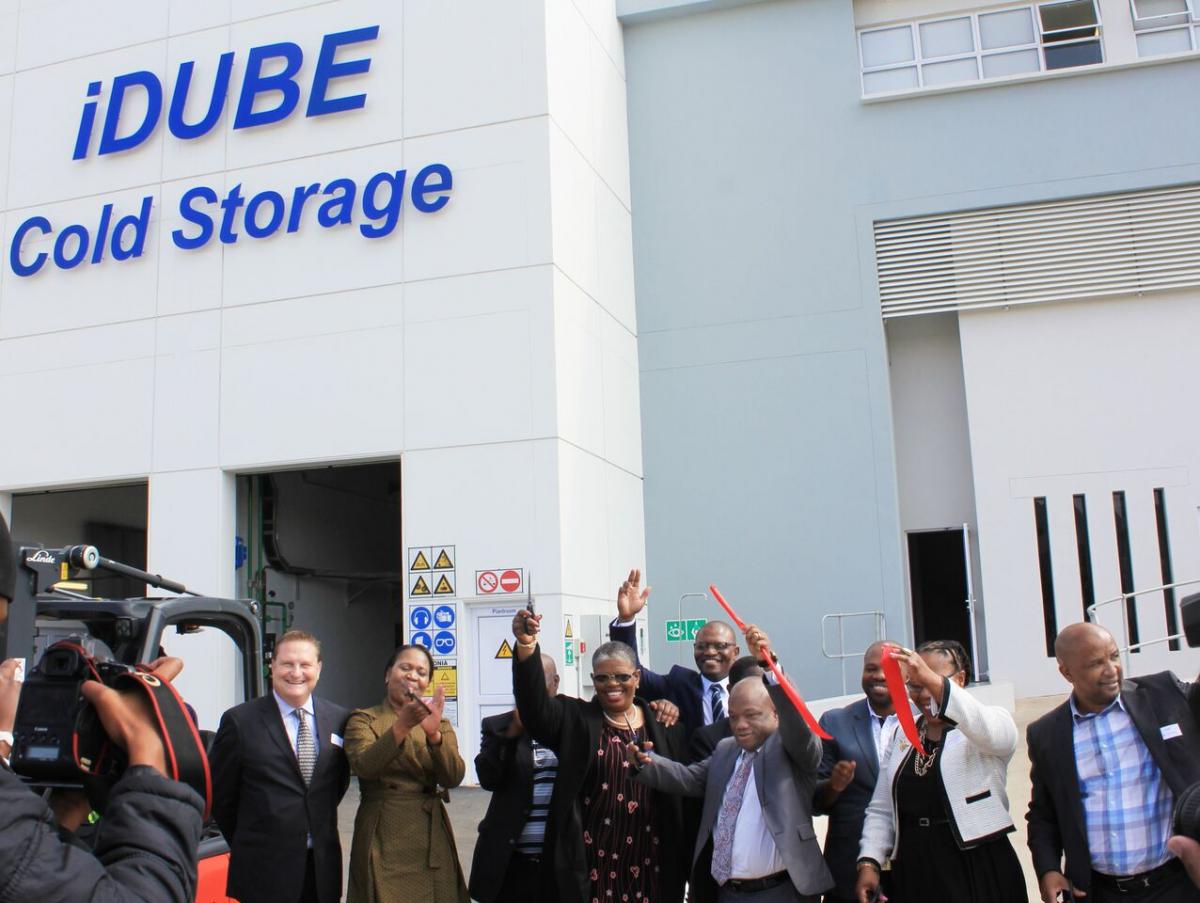 iDube Cold Storage is catering to a growing demand for chilled and frozen perishables storage in the region. The 4 500m2 facility can handle 8 600 mobile pallet positions and store up to 12 000 perishable products.
iDube Cold Storage is catering to a growing demand for chilled and frozen perishables storage in the region. The 4 500m2 facility can handle 8 600 mobile pallet positions and store up to 12 000 perishable products.
When operating at full capacity, iDube Cold Storage will employ around 80 staff, drawing its labour from a pool of experienced professionals. It will also create job opportunities for local communities, adding to the 5 500 jobs that have already been created.
The facility will initially cater to meat importers, servicing local retailers, and exporters of dairy, fruit concentrate and citrus to markets in the European Union and the Far East. Its services also include weighing, sorting, repackaging, order picking, container plug-in of products and distribution and logistics solutions.
Enhancing value chains
MEC for Economic Development, Tourism and Environmental Affairs Sihle Zikalala described the facility as a great example of government’s continued efforts to support the development of industries that enhance the effectiveness of value chains throughout the economy.
“From production to processing, it is essential that we provide healthy and highly competitive business operating environments which will present new opportunities for established and emerging enterprises.”
He added: “To date, we have attracted R1.5 billion in private sector investment through various developments within the SEZ, and R4.25 billion in investment is in the immediate pipeline for developments in the second phase of the iDube Trade Zone.”
Black Industrialist Programme
iDube Cold Storage falls under the umbrella of the Department of Trade and Industry’s Black Industrialist Programme, with the KwaZulu-Natal Growth Fund providing R63.4 million in funding.
KZN Growth Fund acting CEO Aubrey Shabane said the funding was motivated, in part, by the support of the Black Industrialist Programme, as 50 per cent of iDube Cold Storage’s shareholding is in the hands of previously disadvantaged individuals.